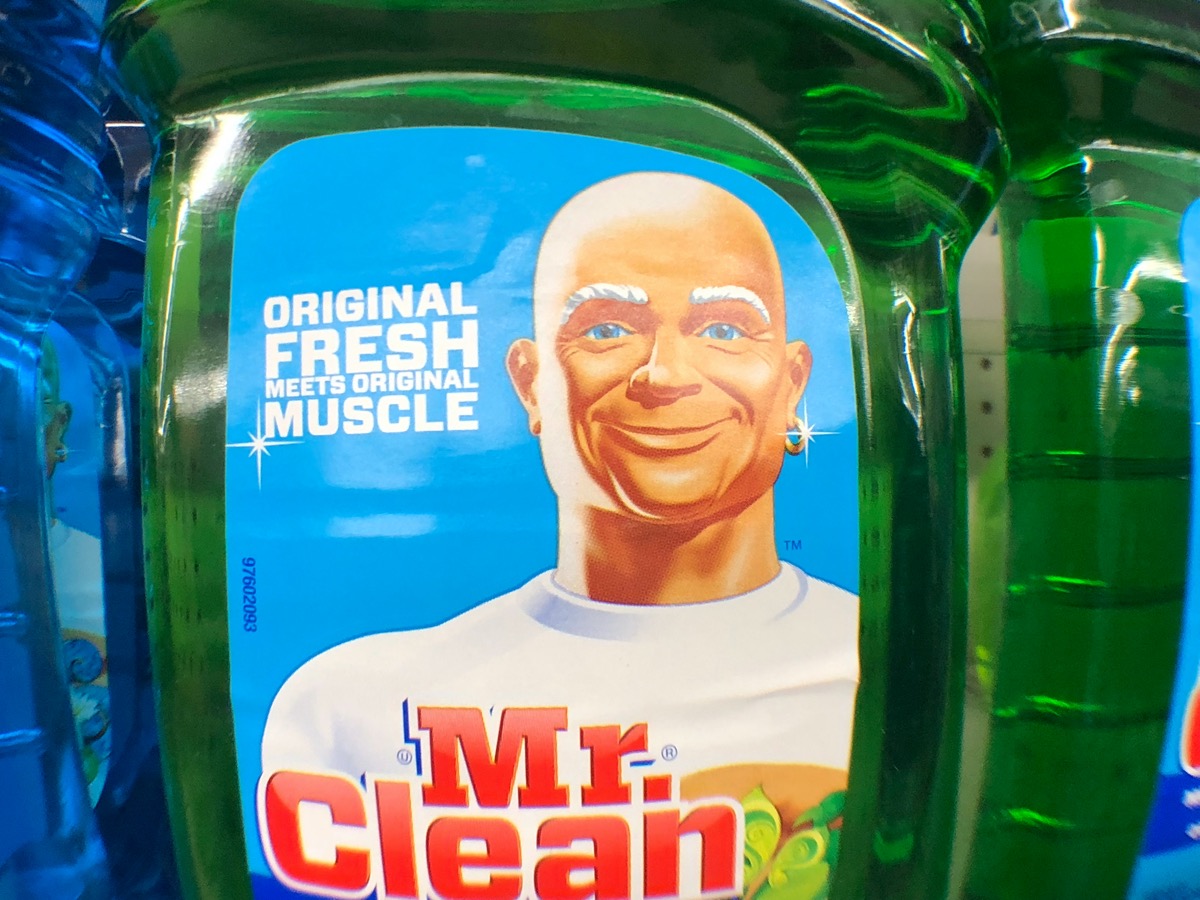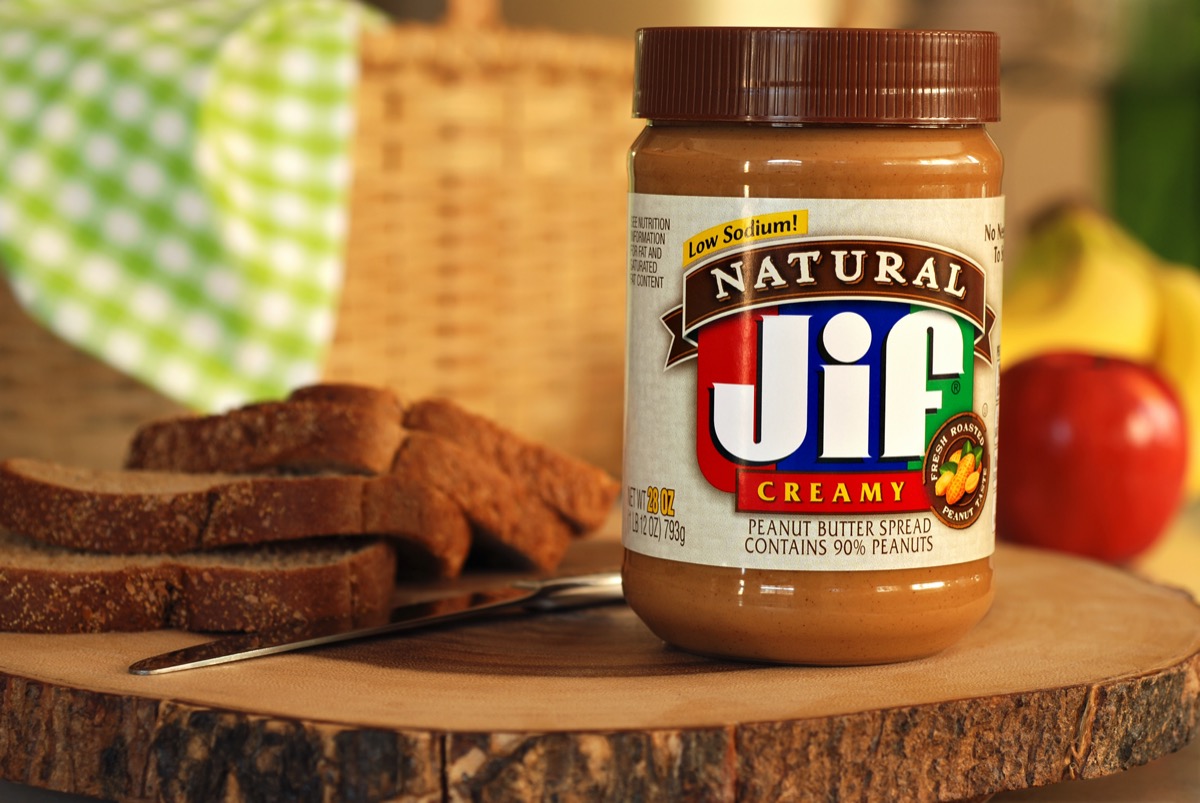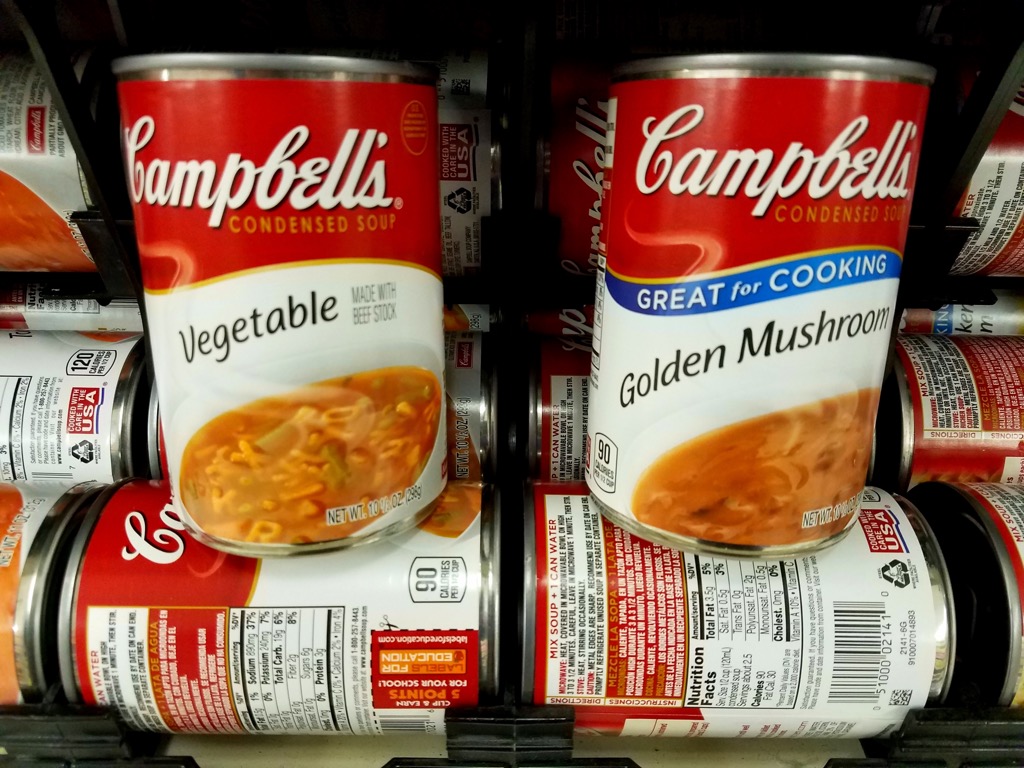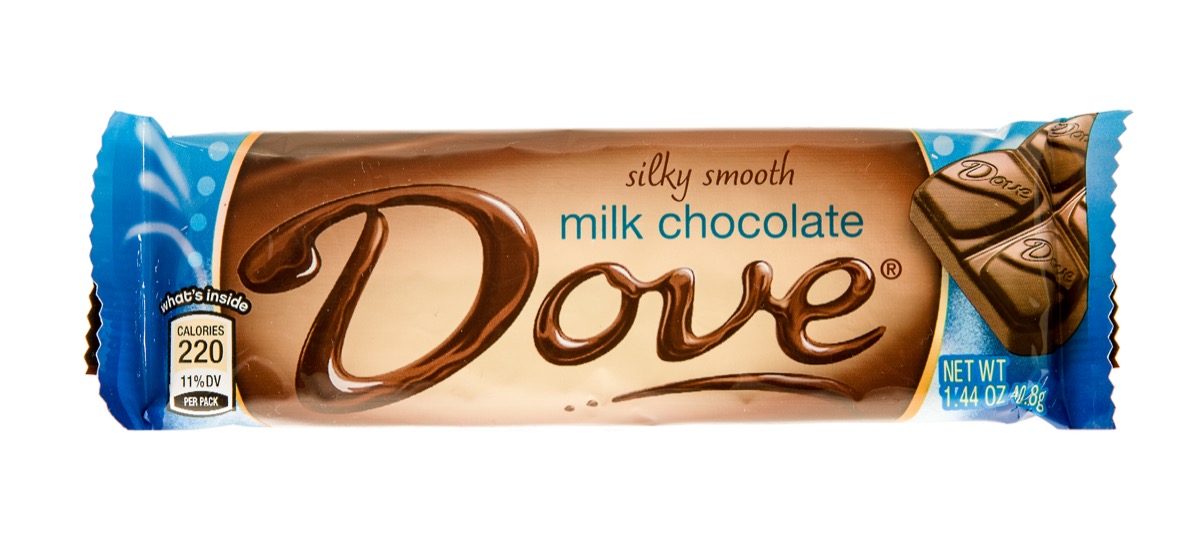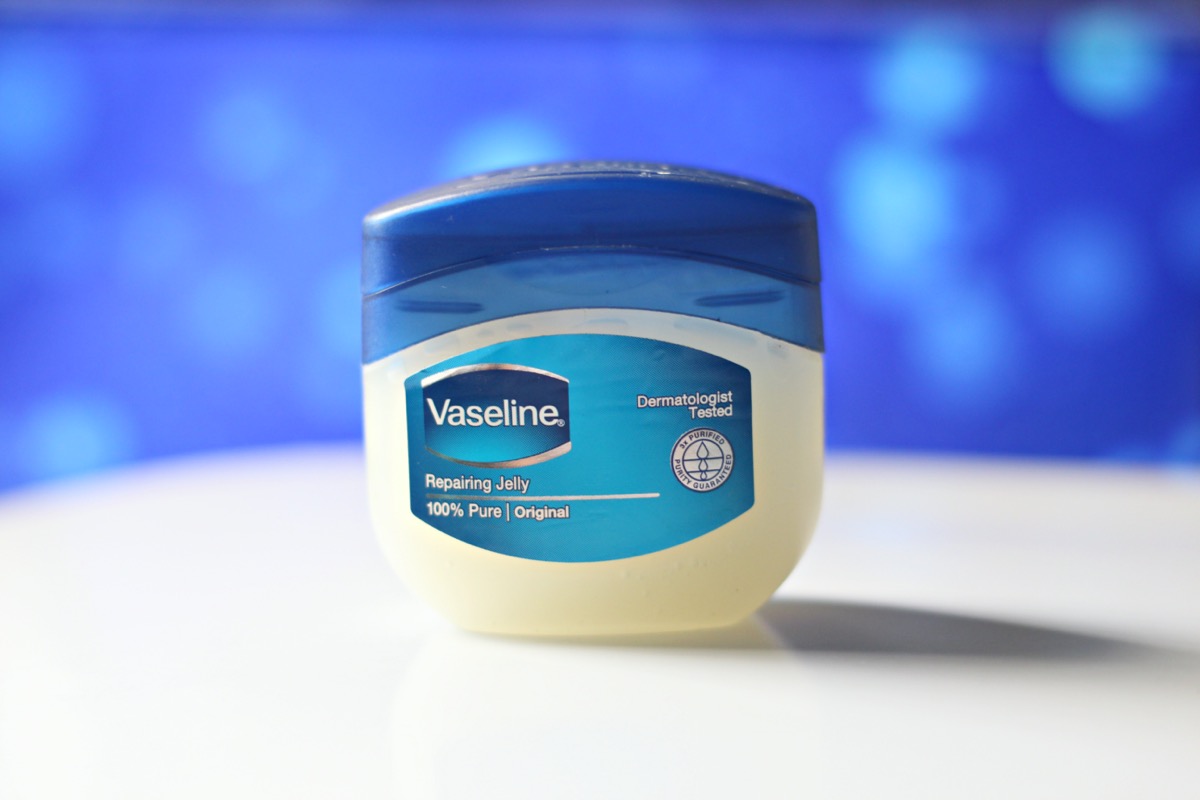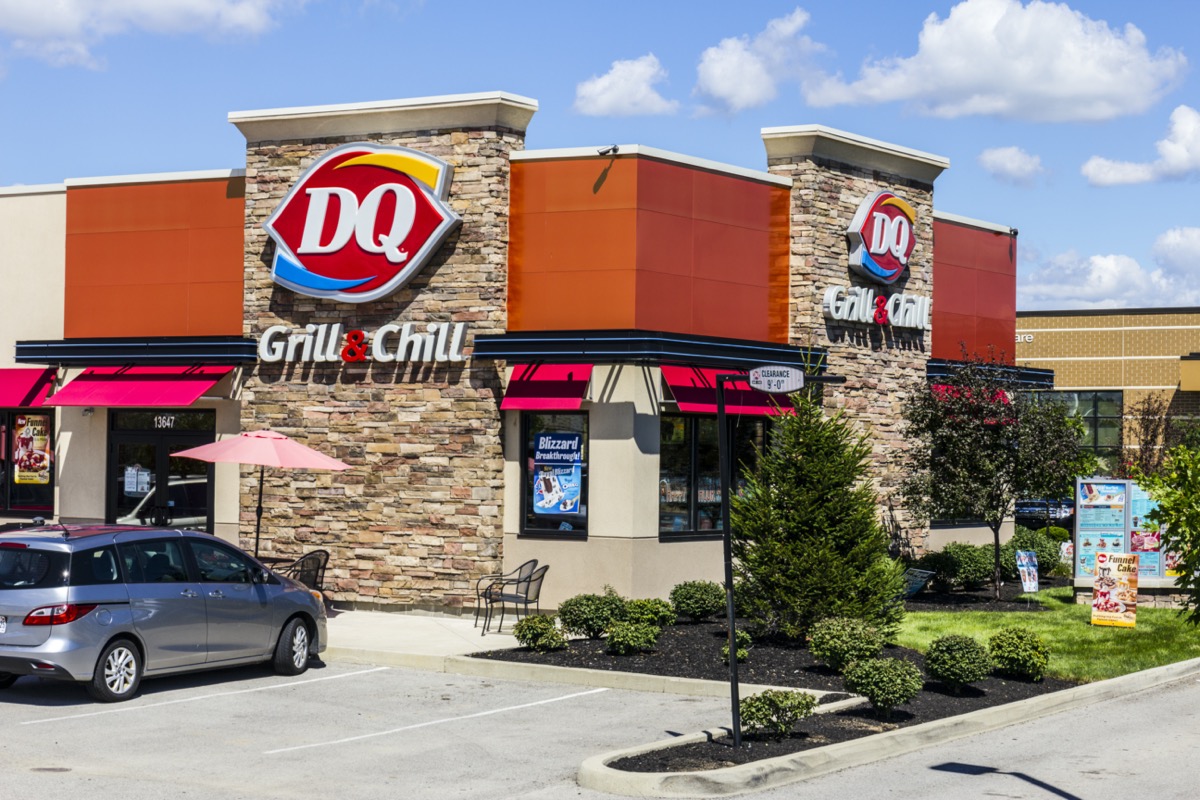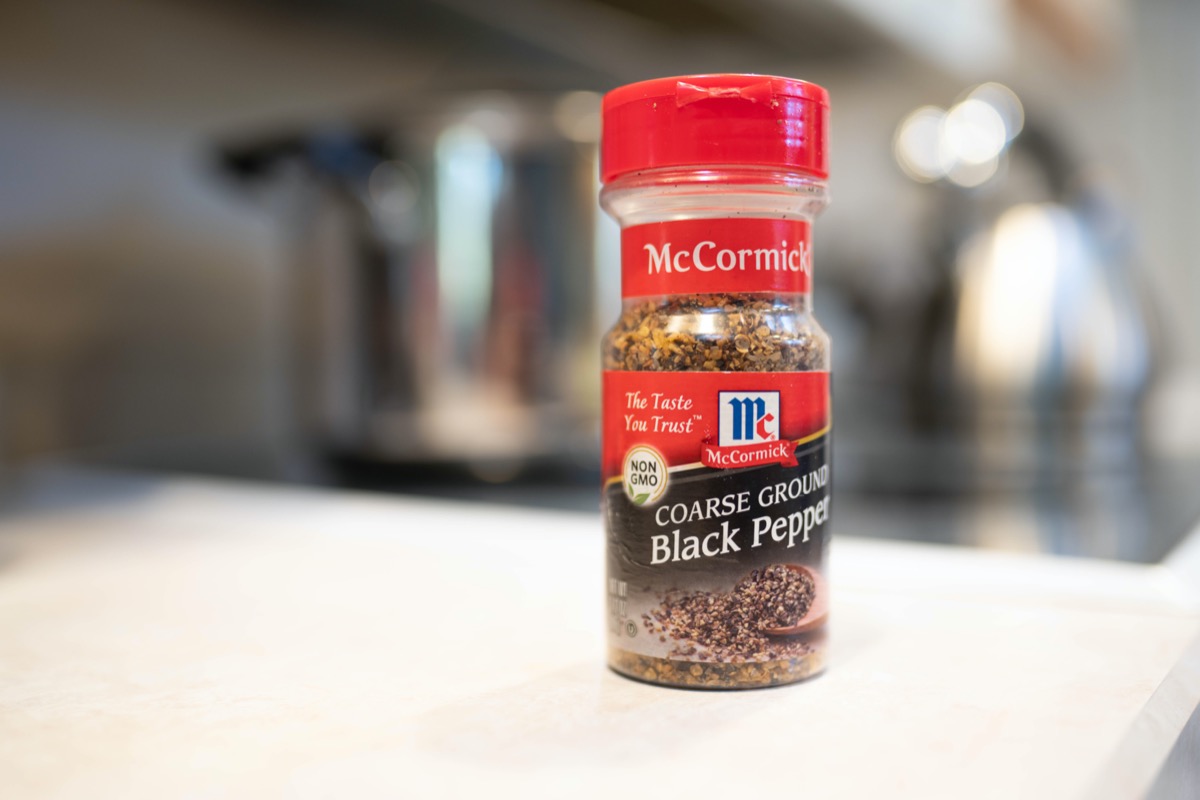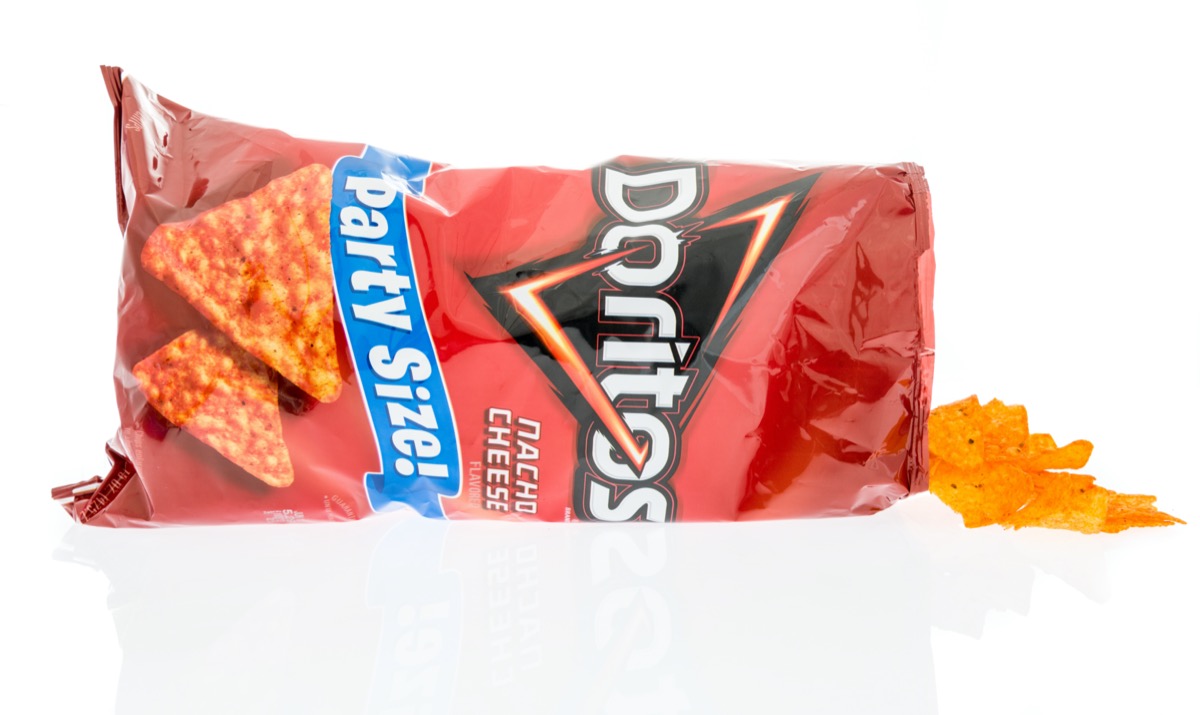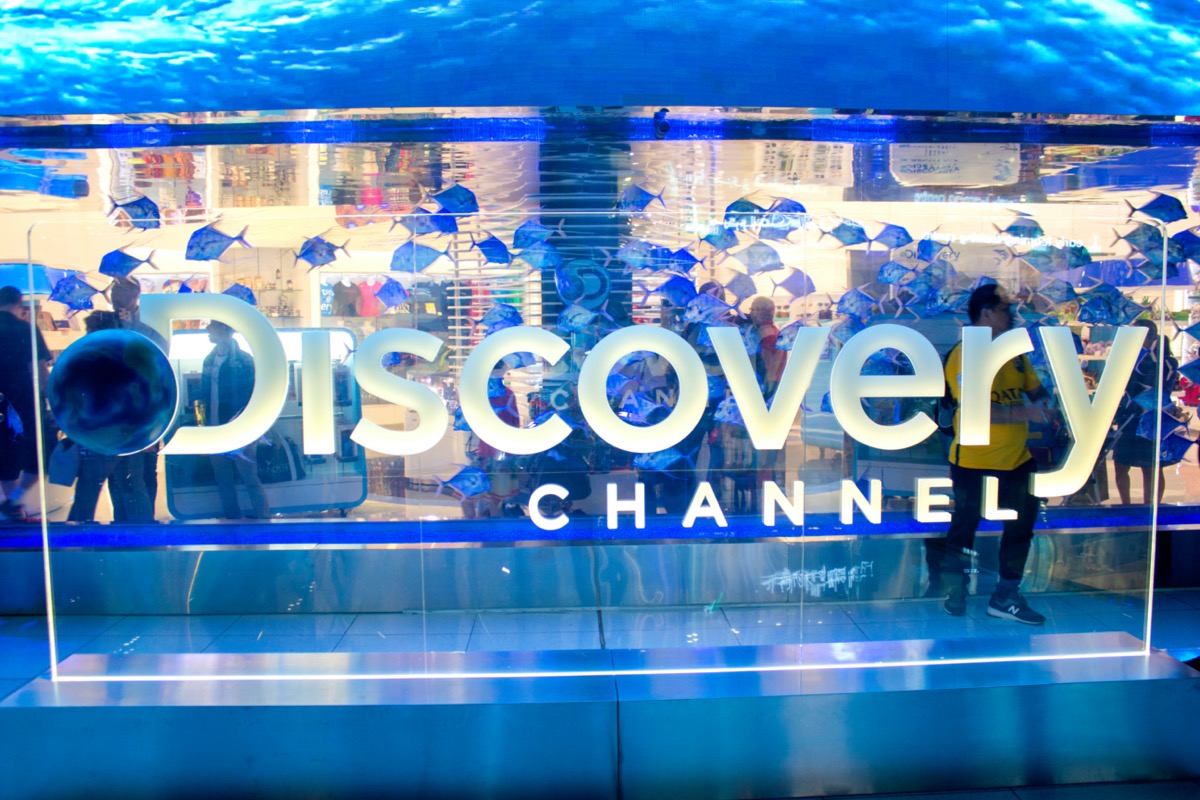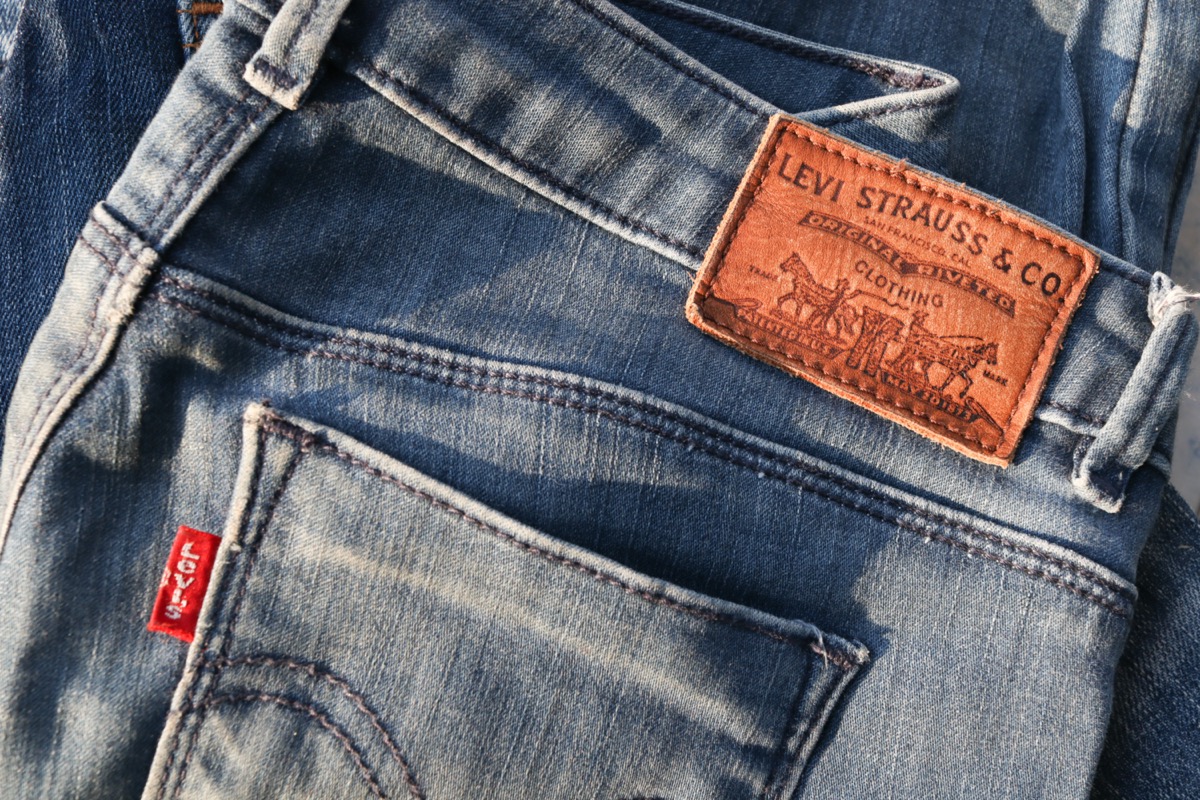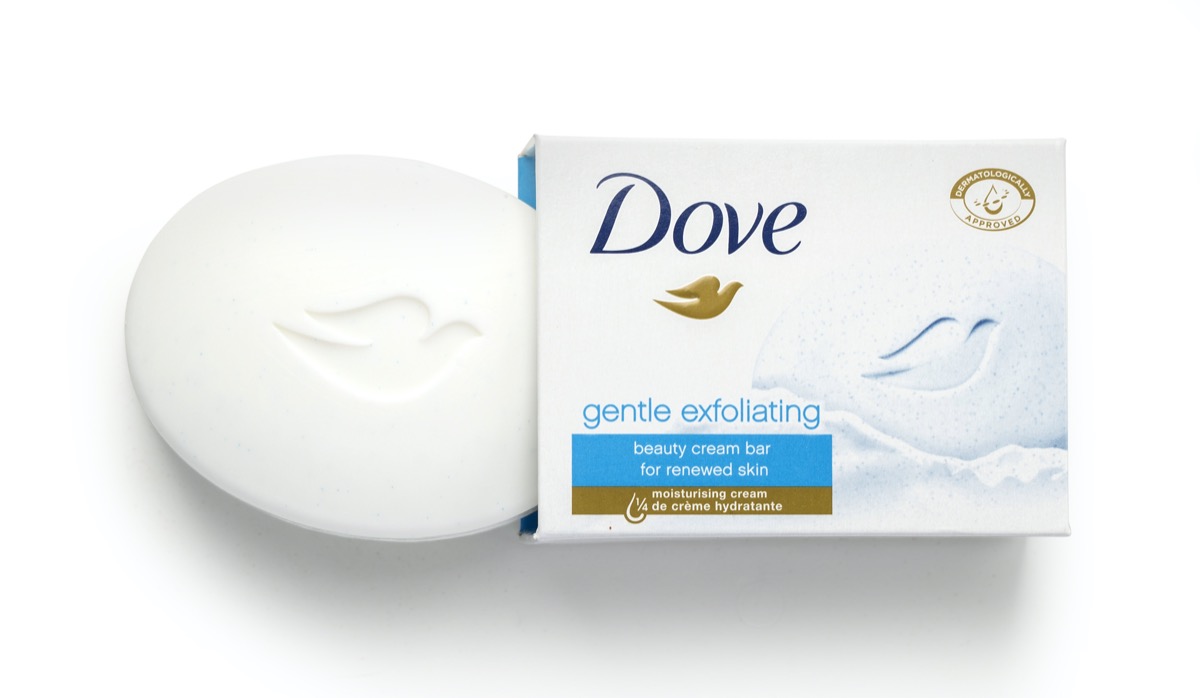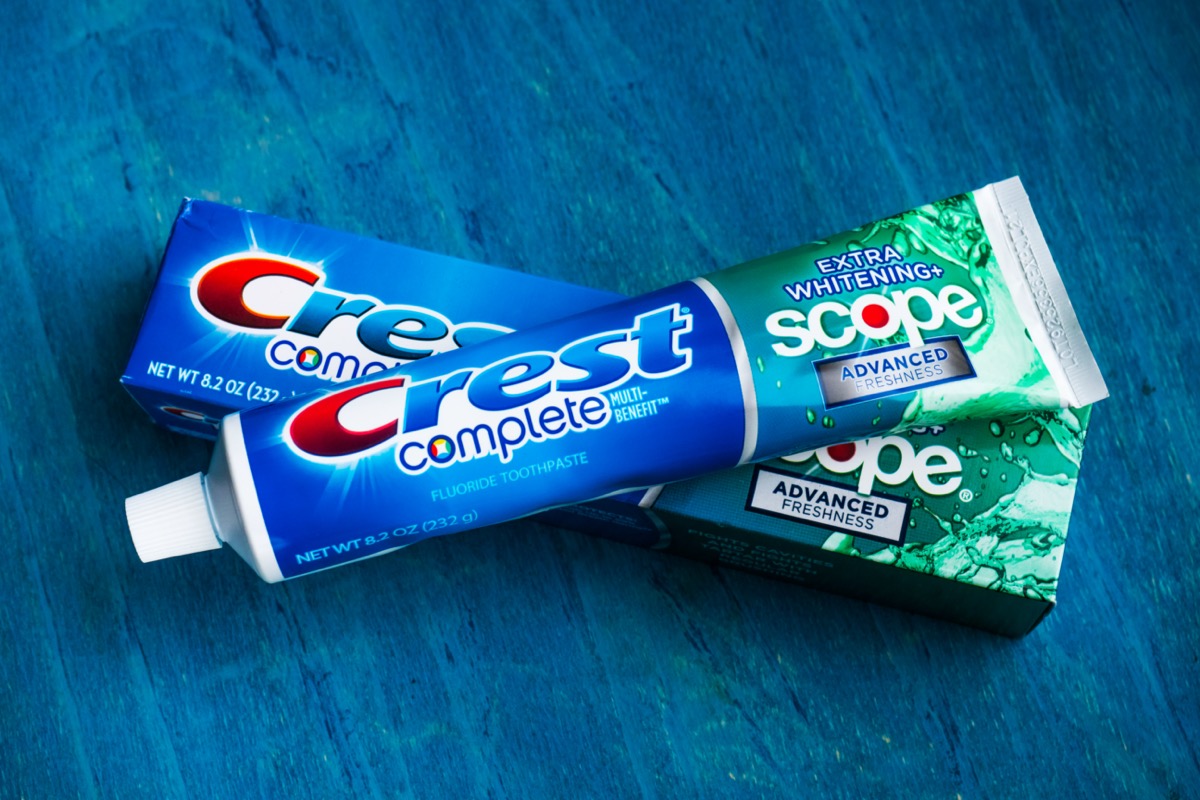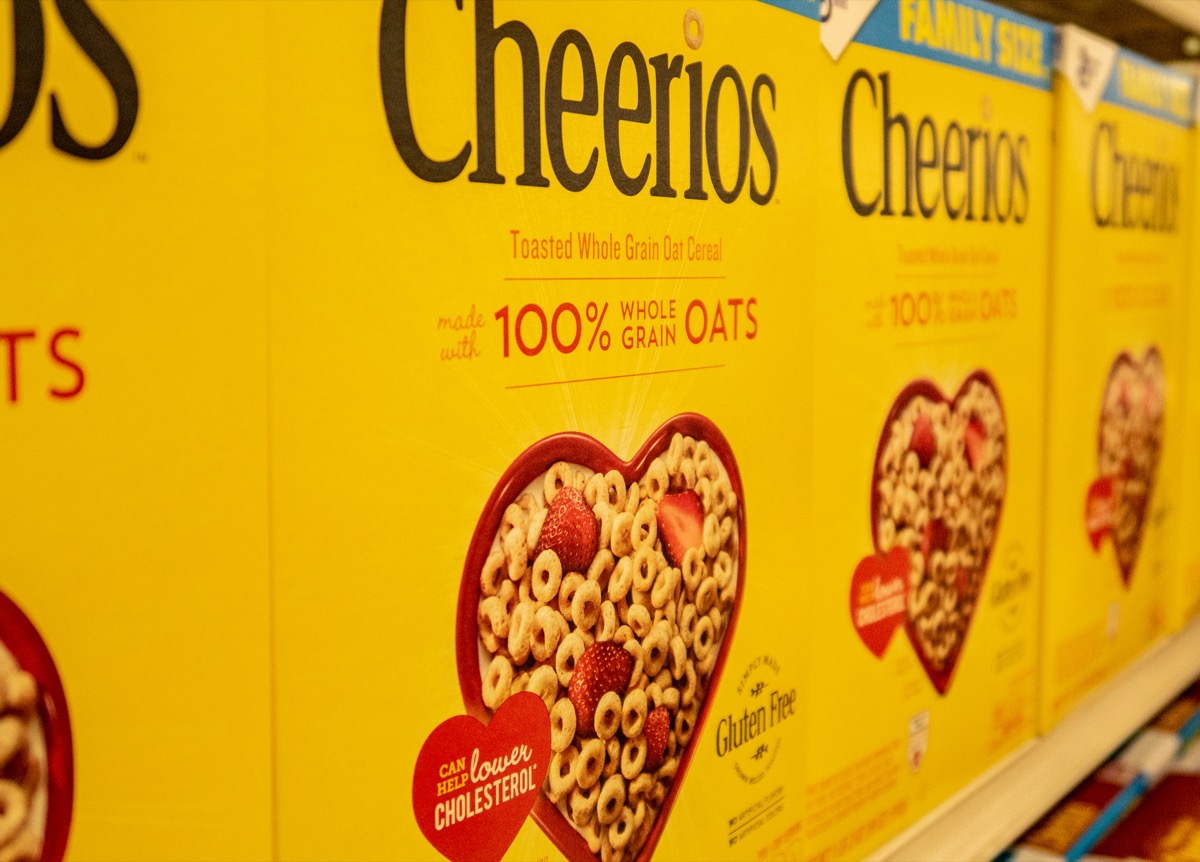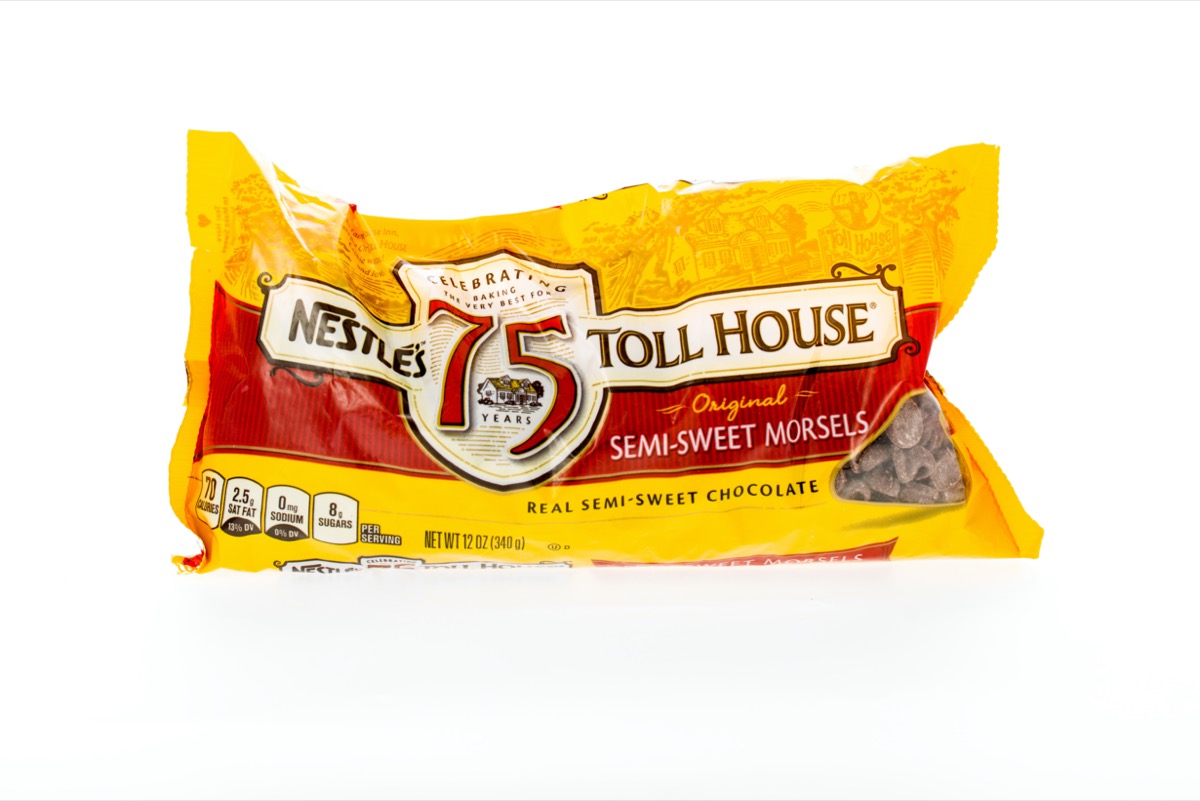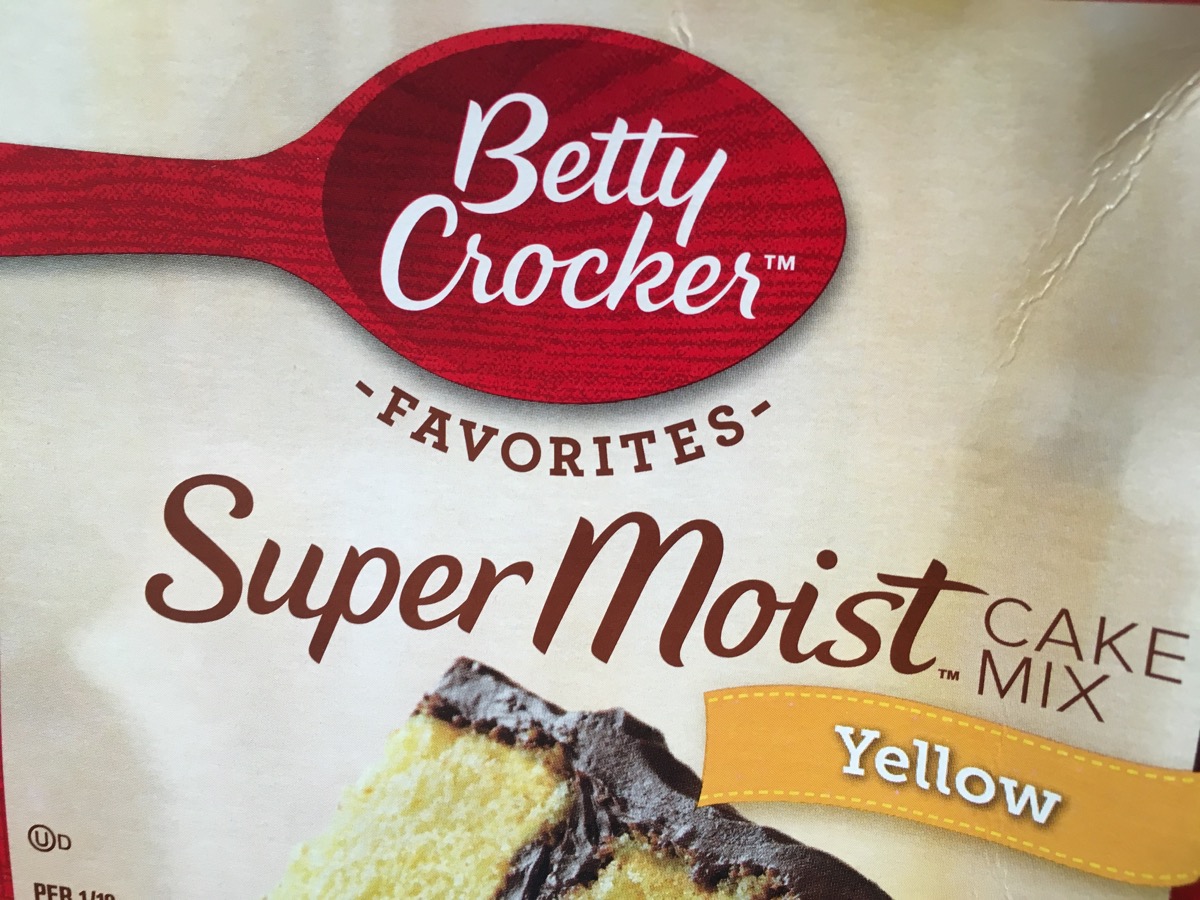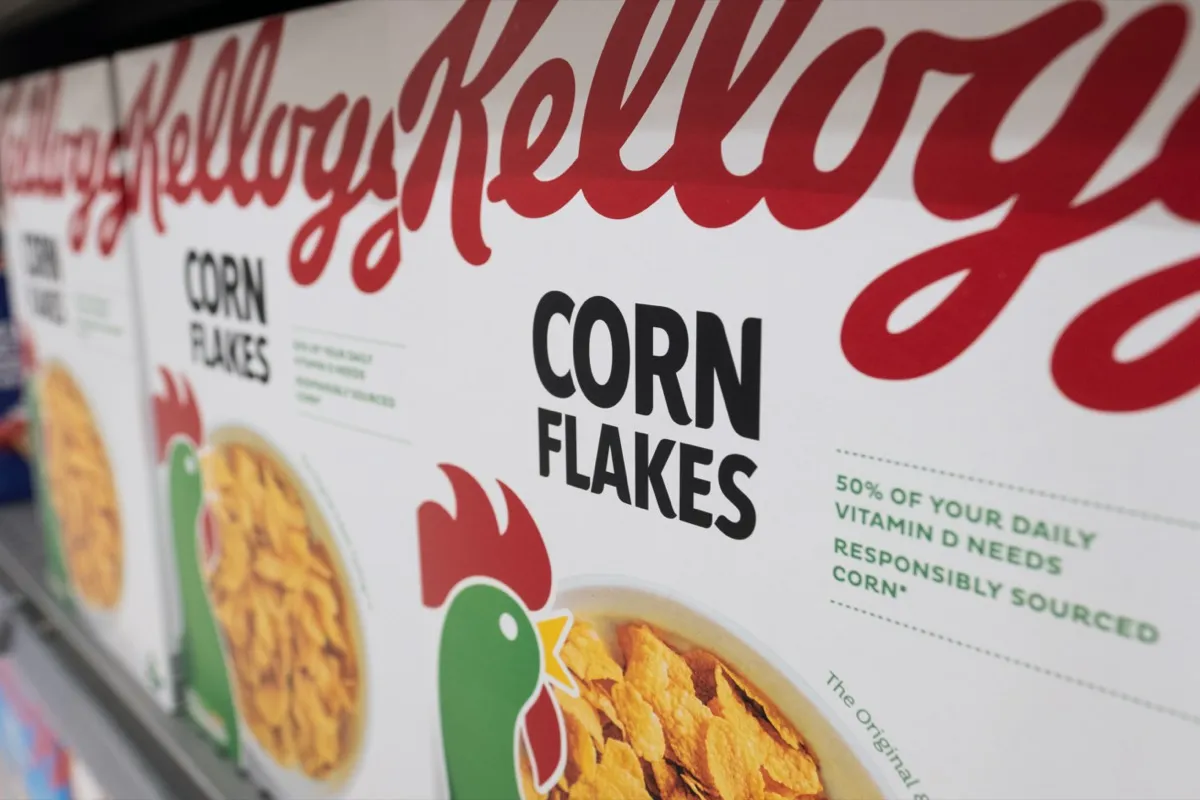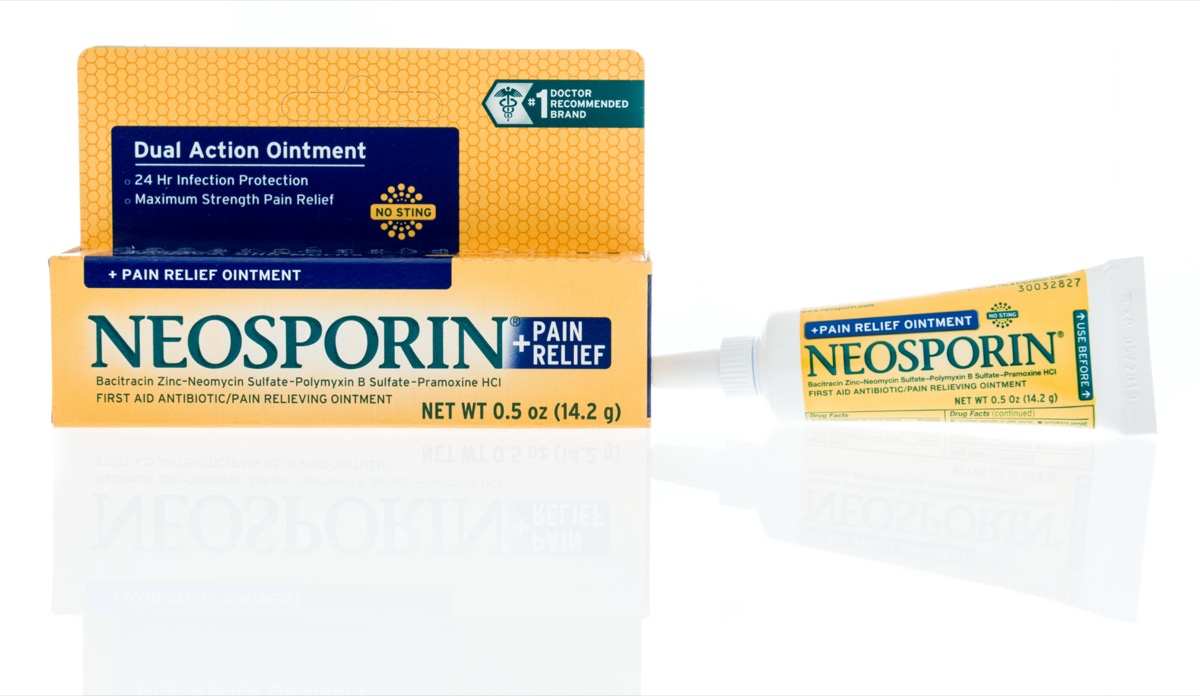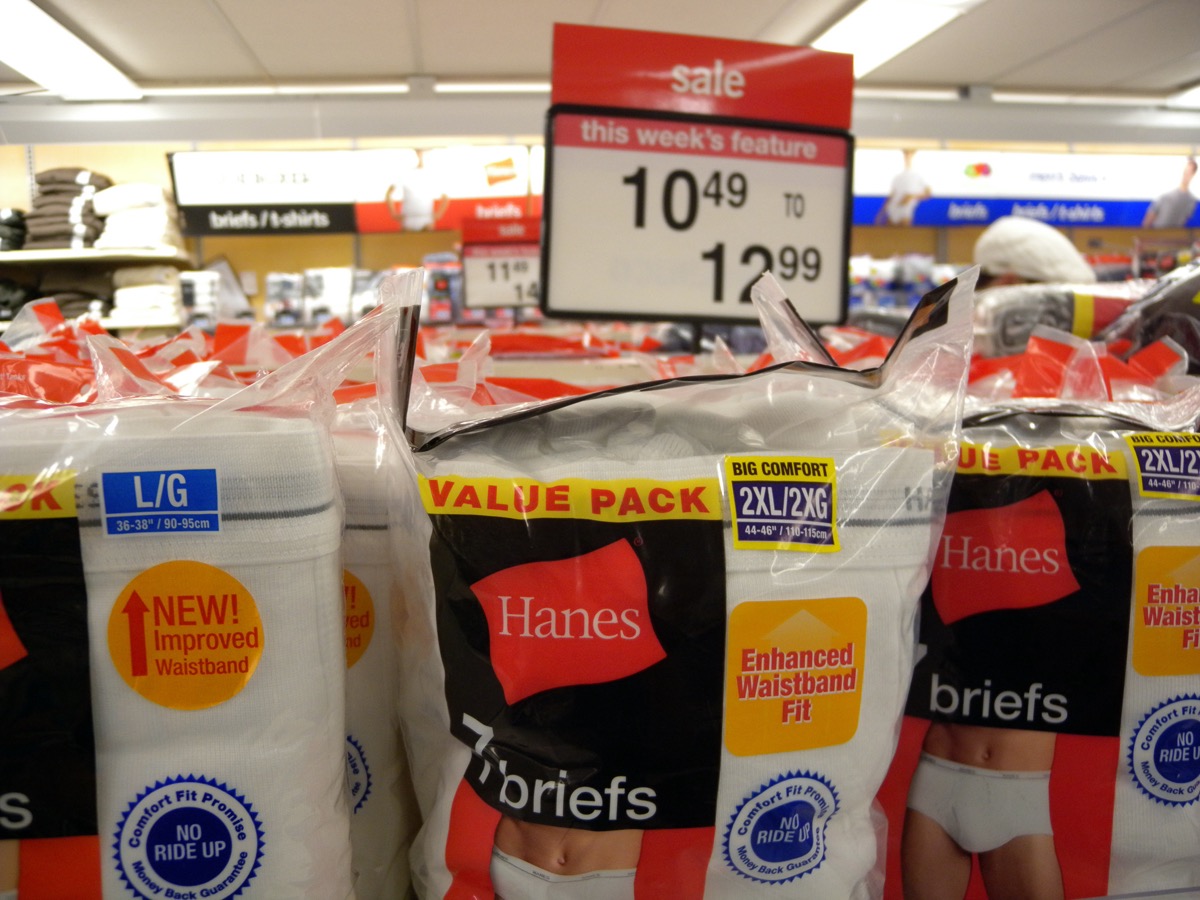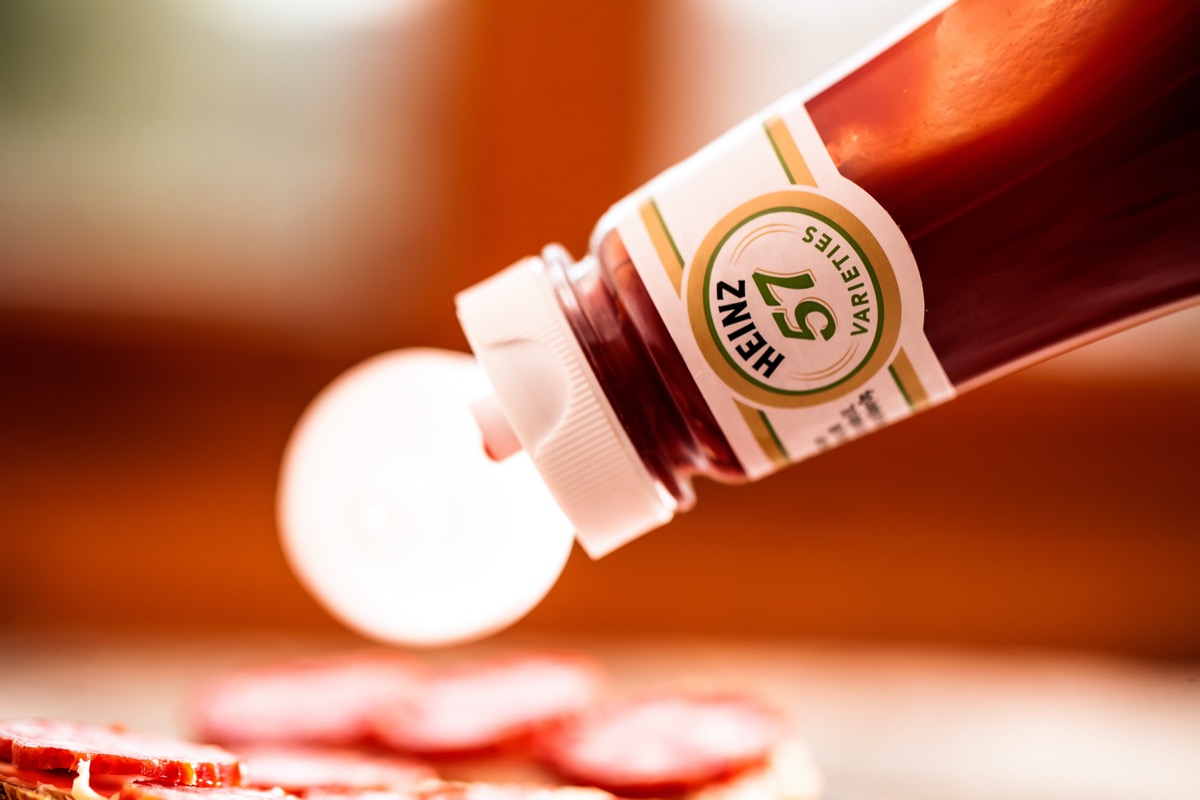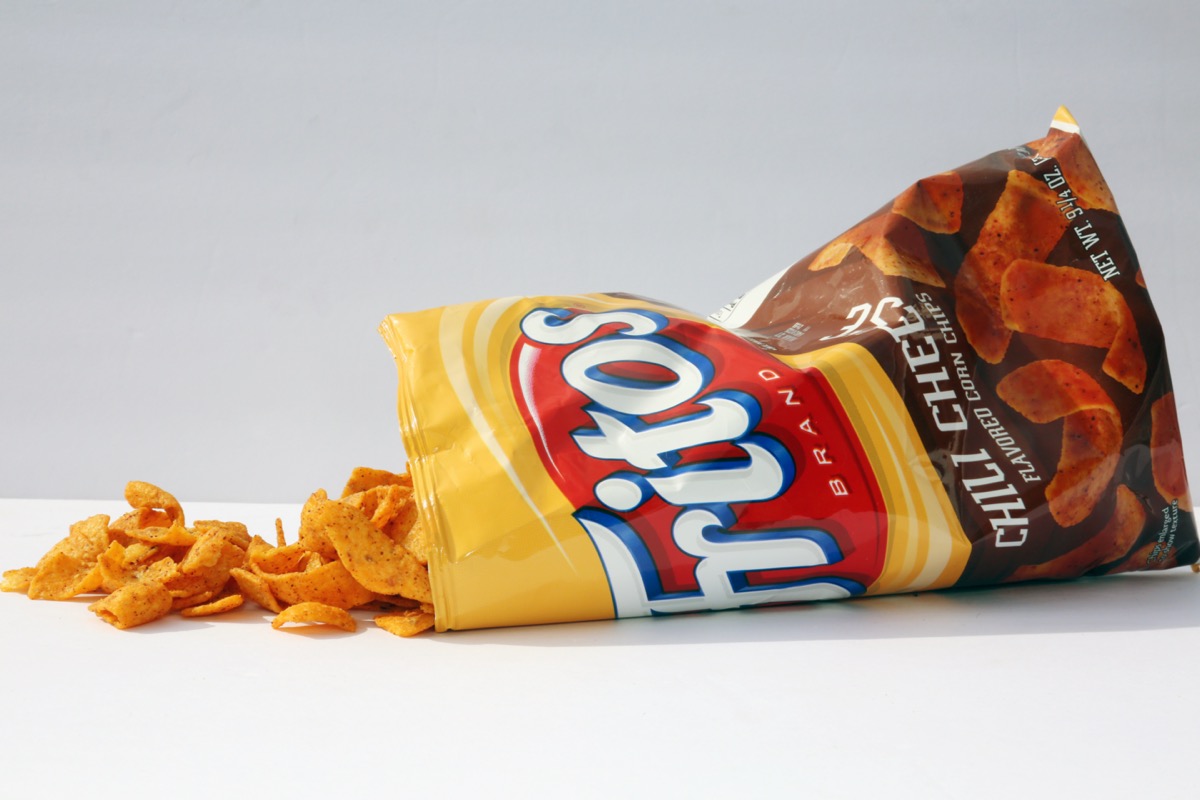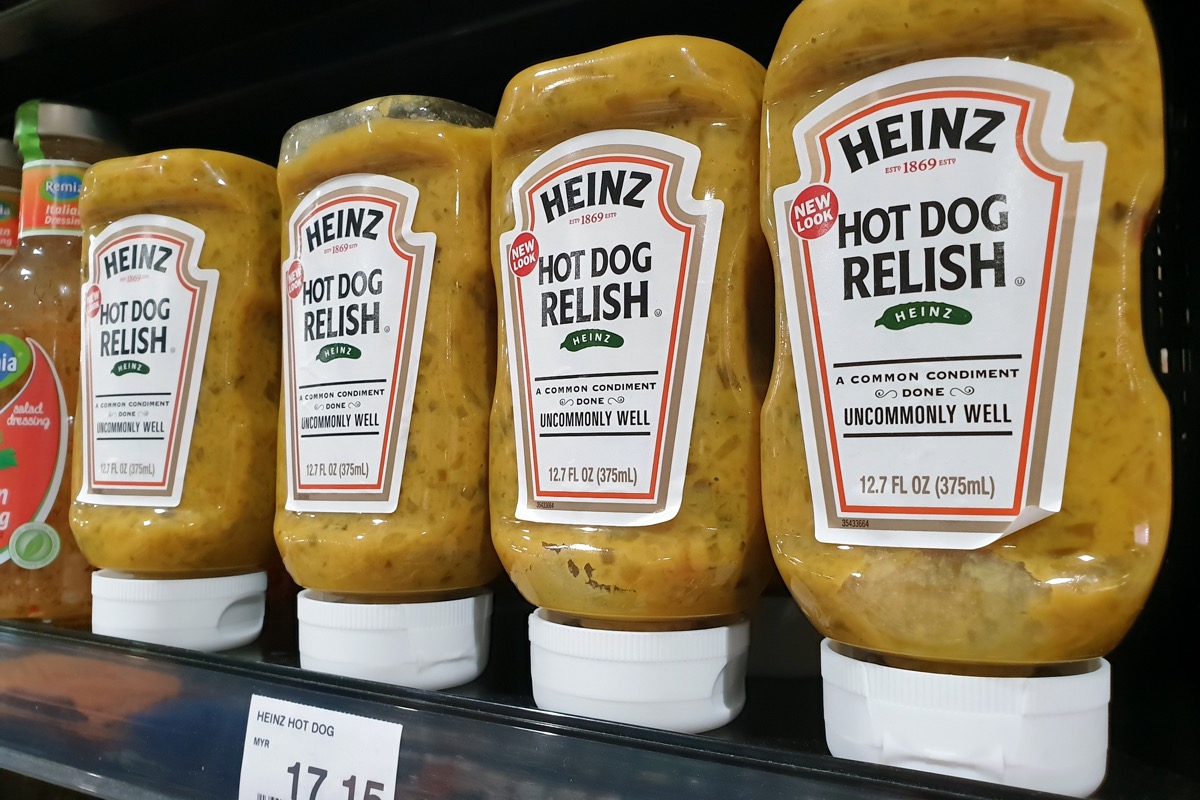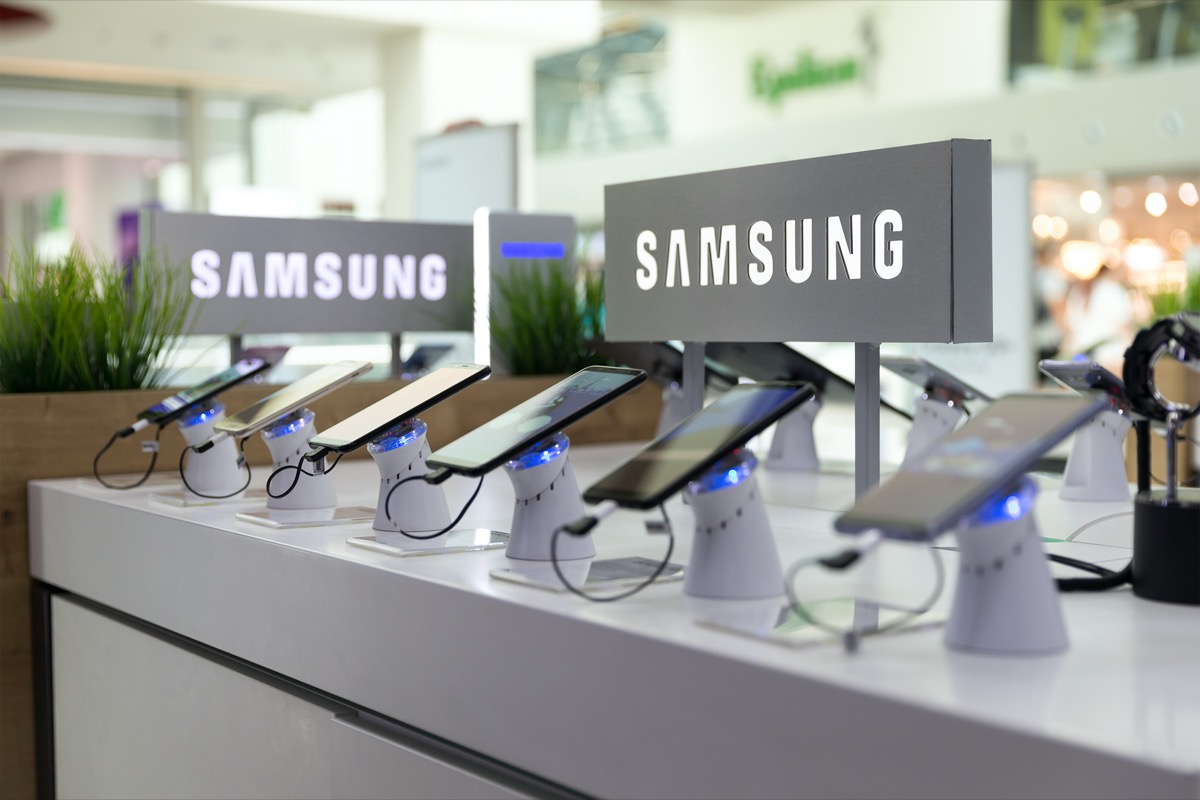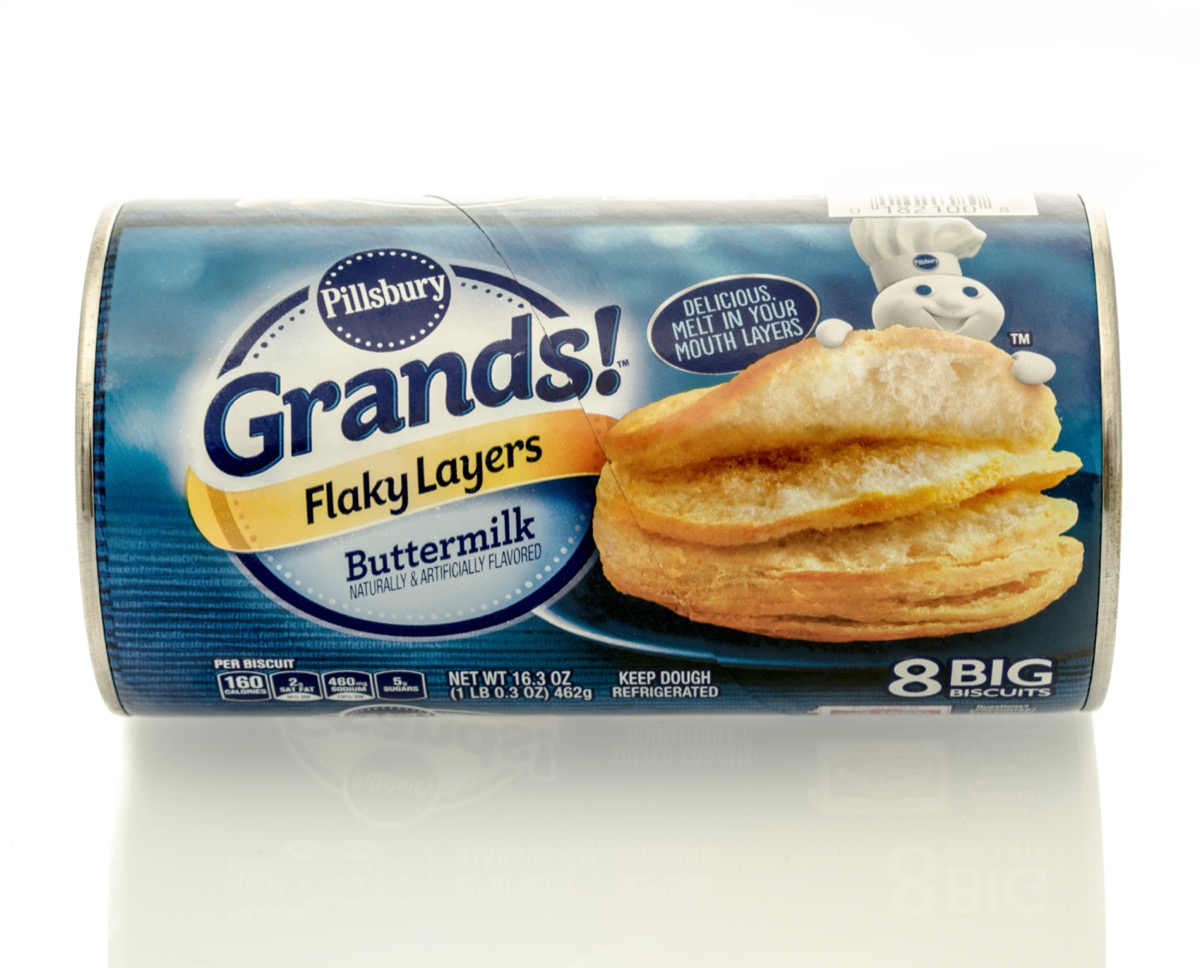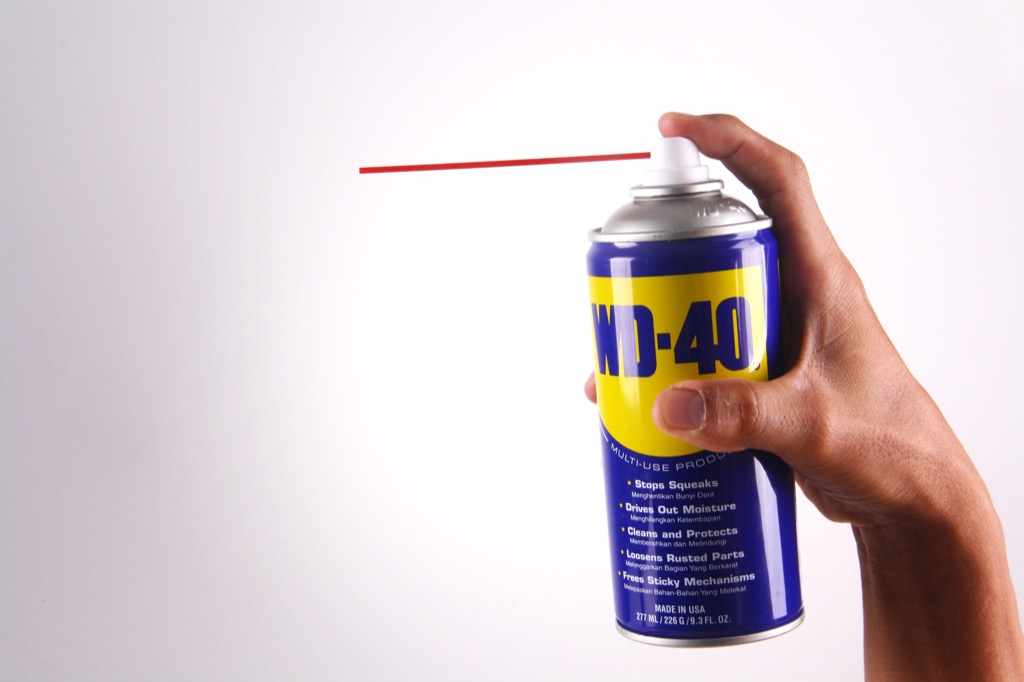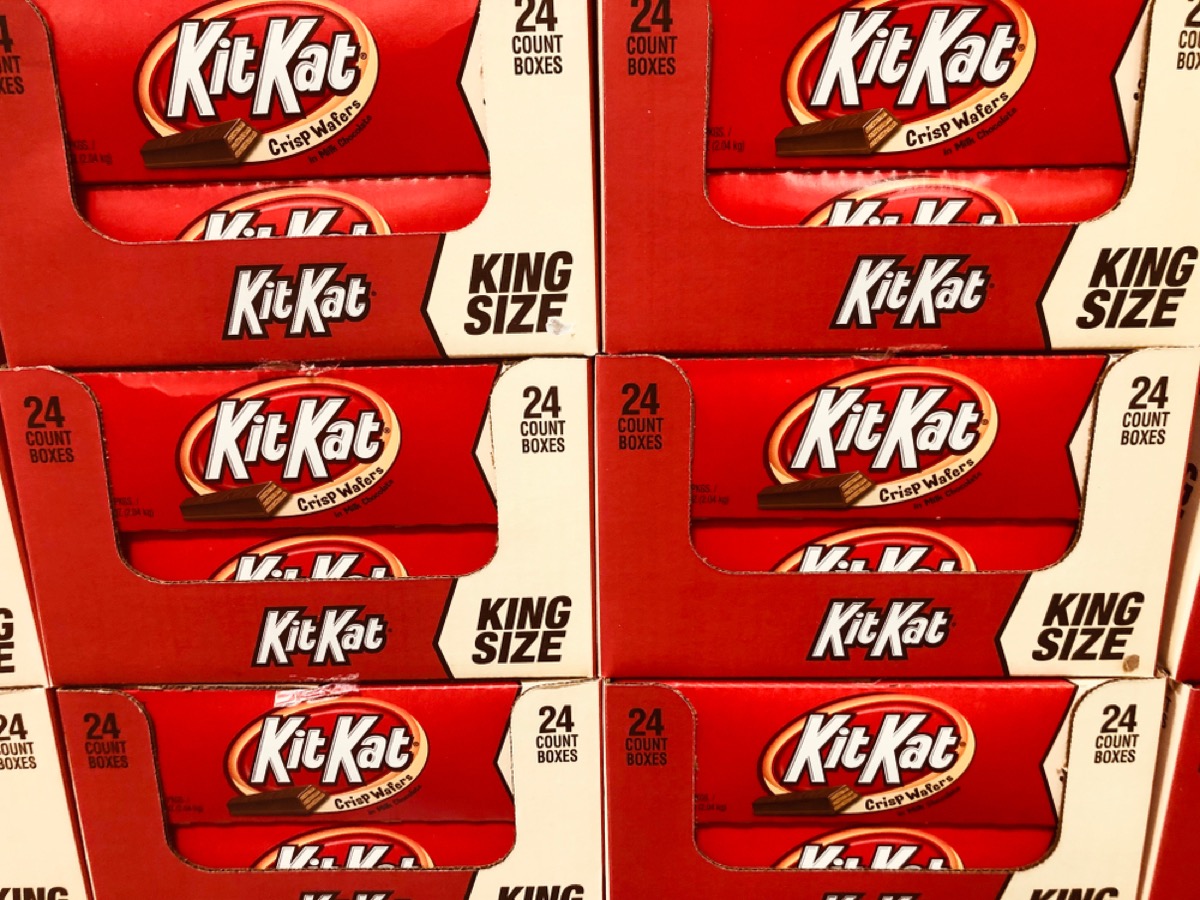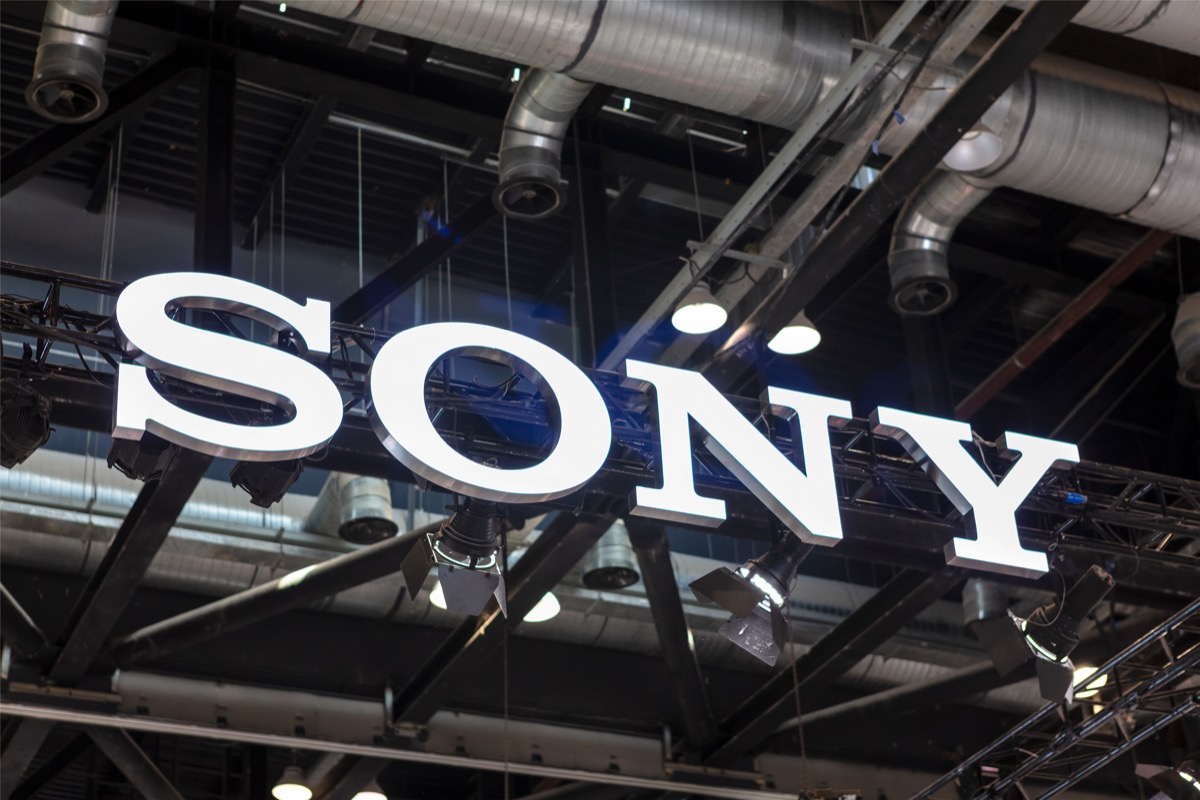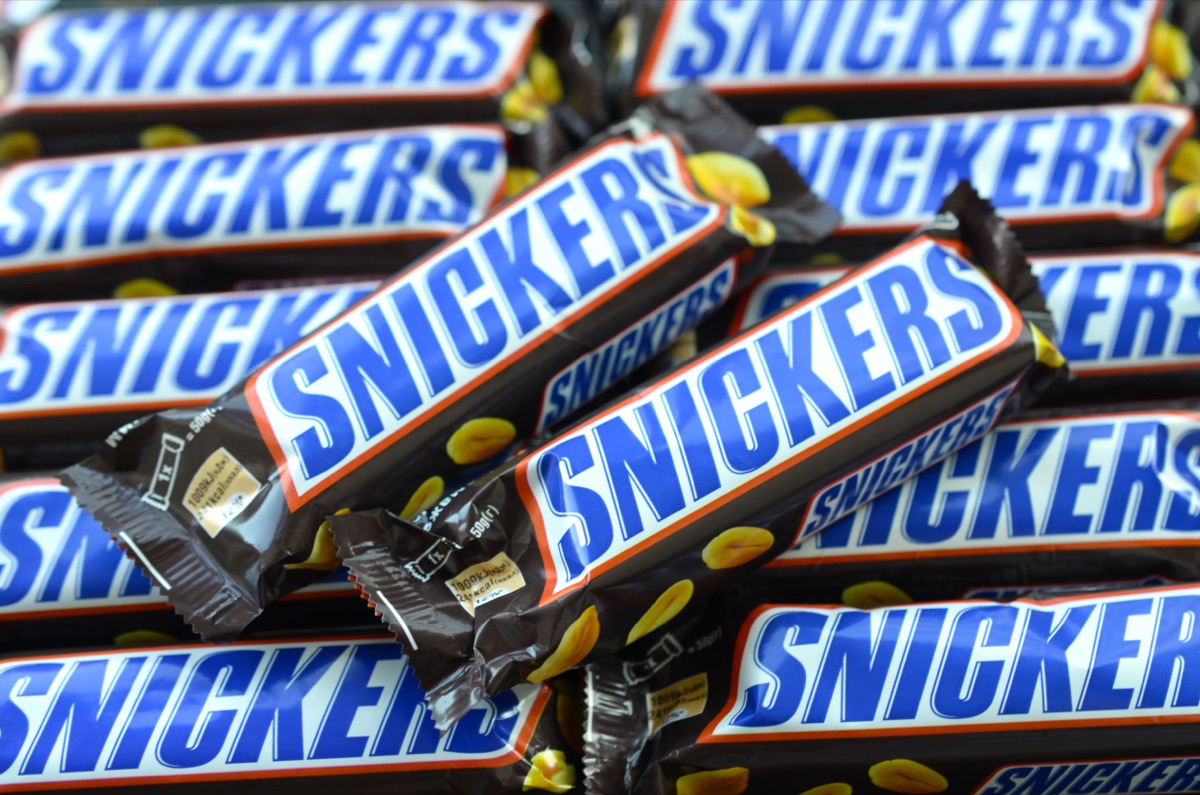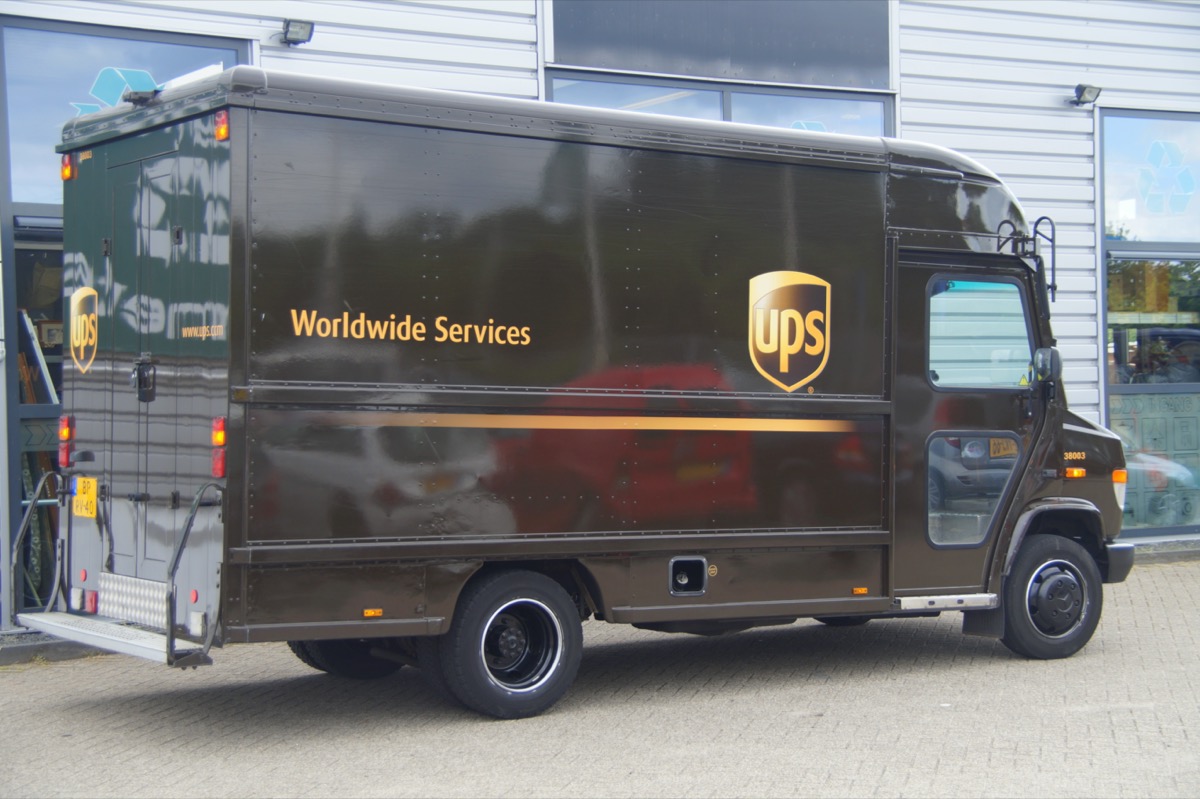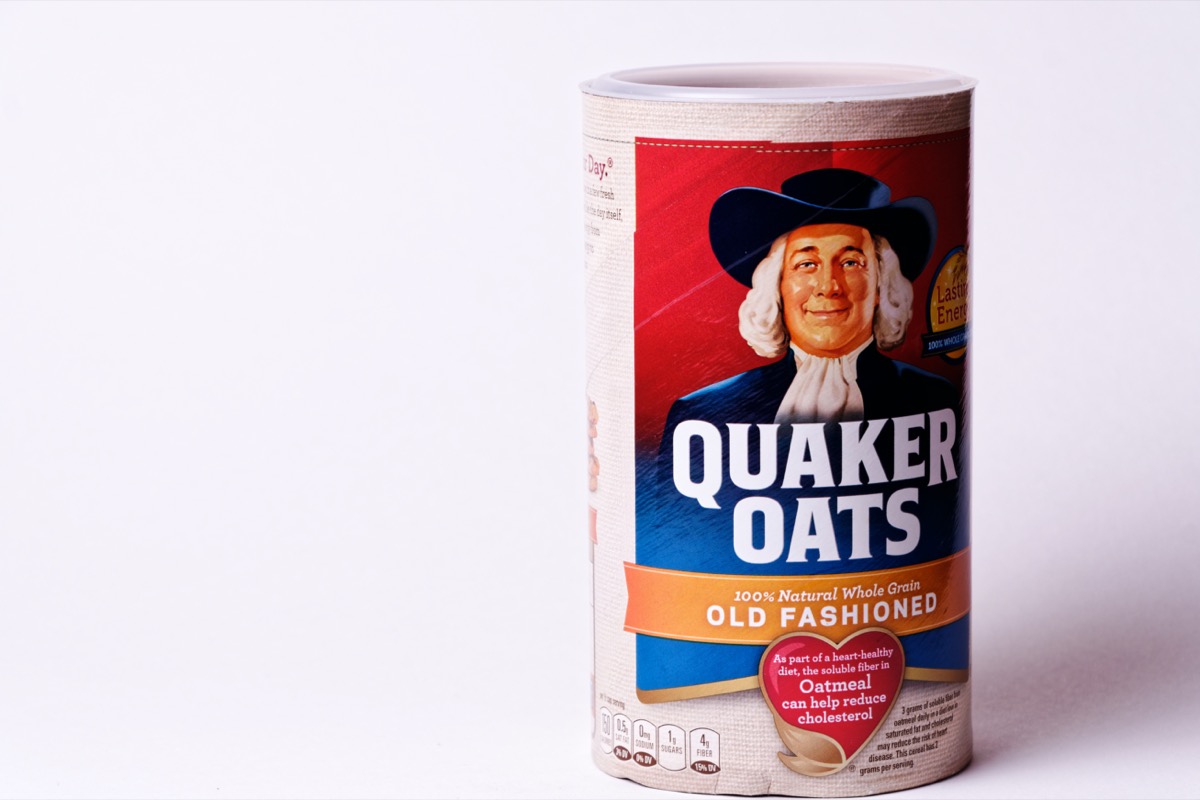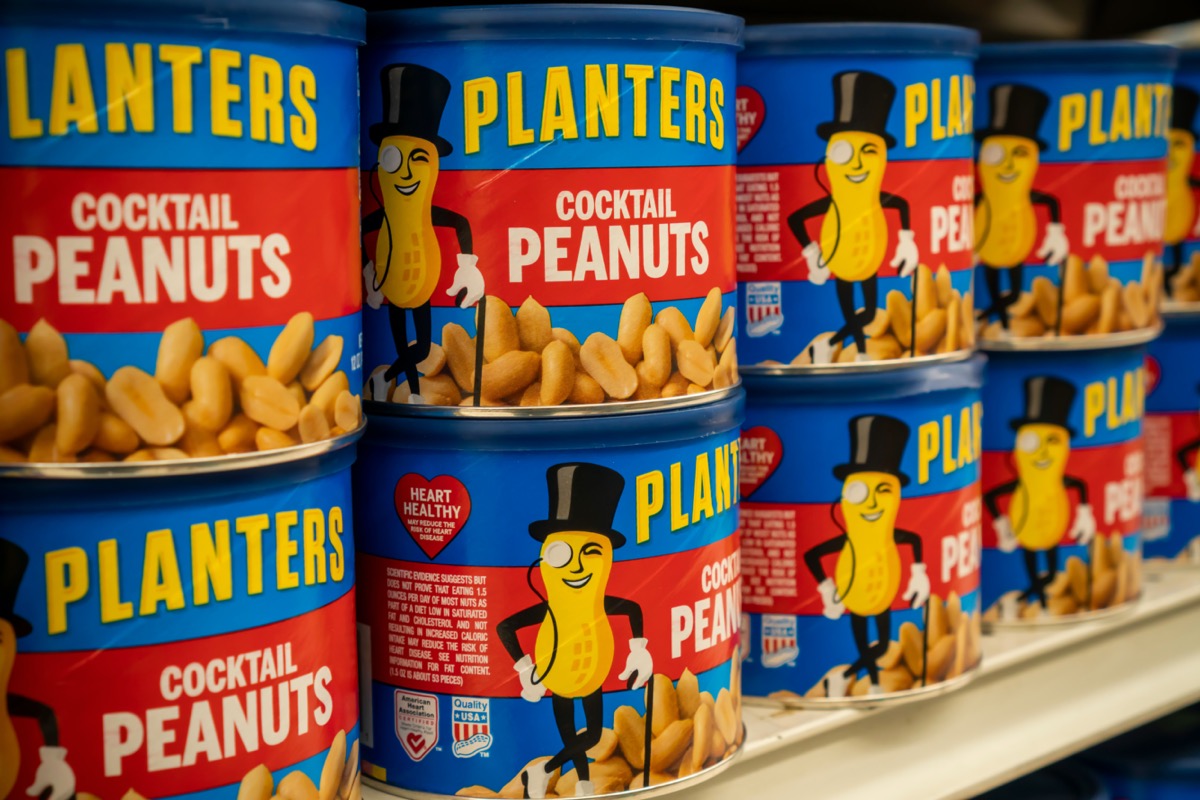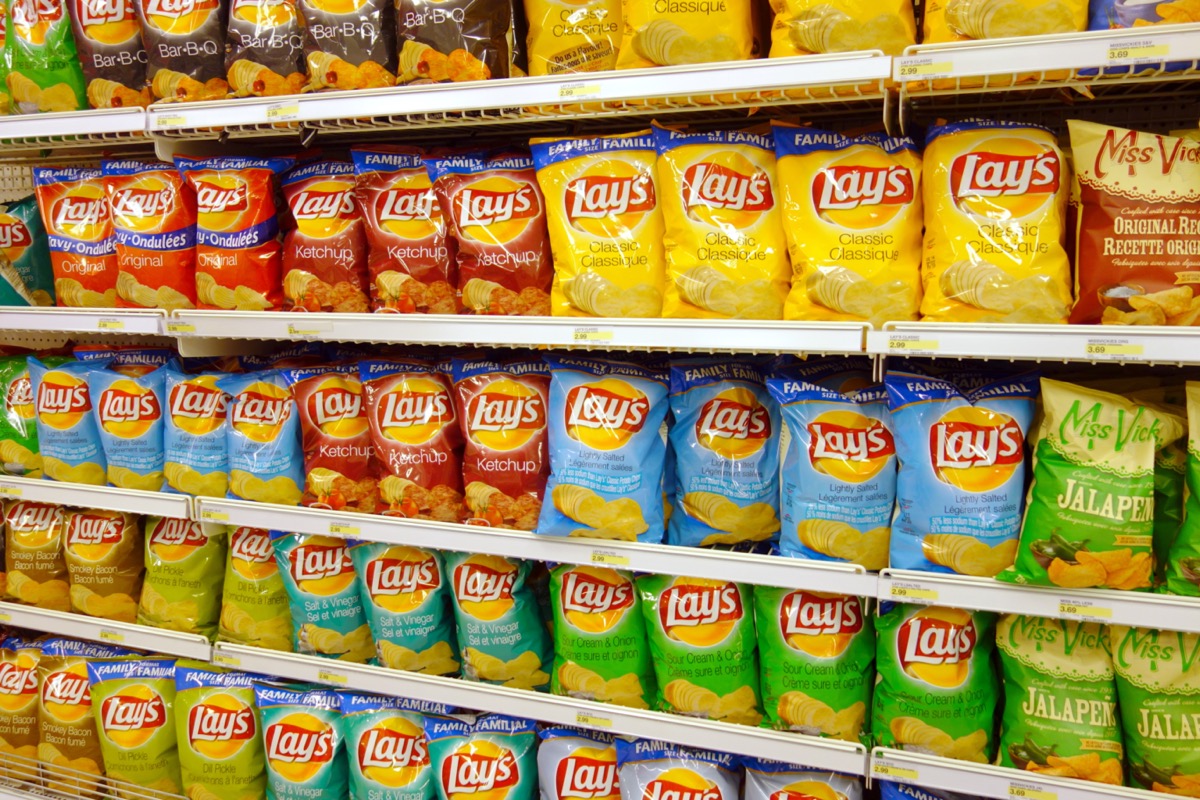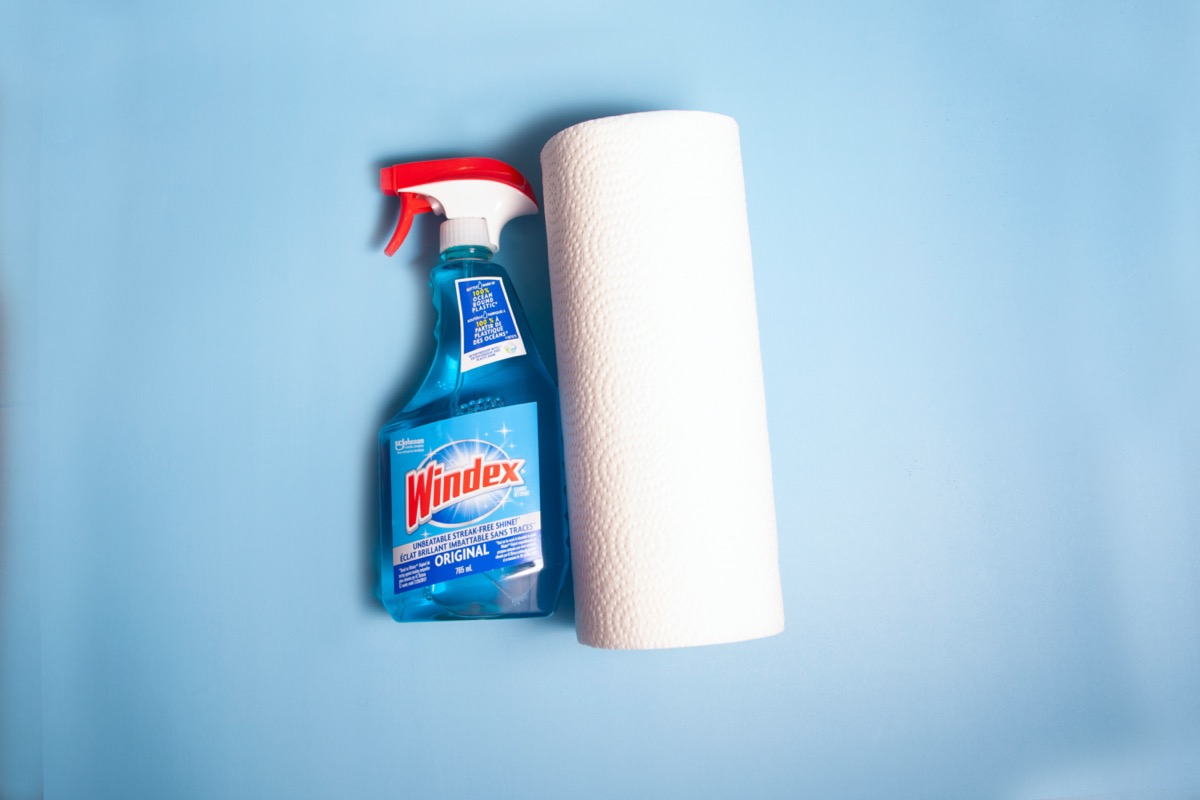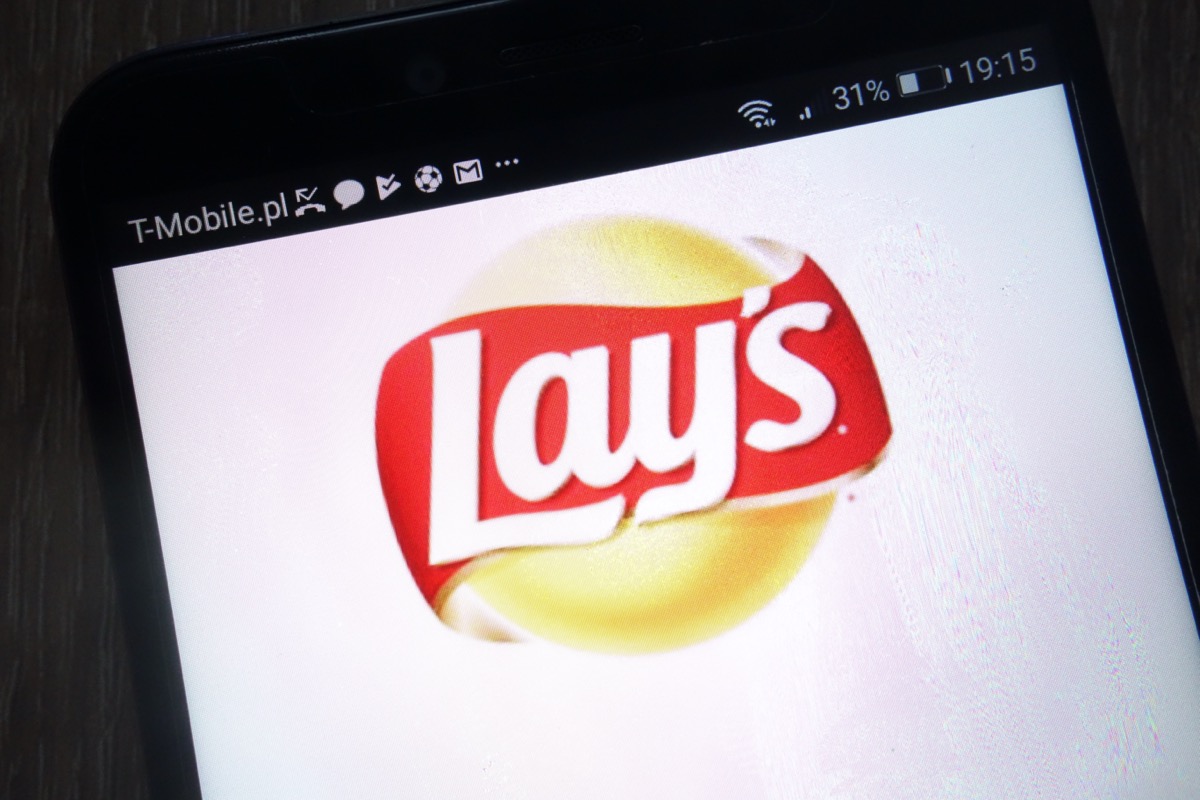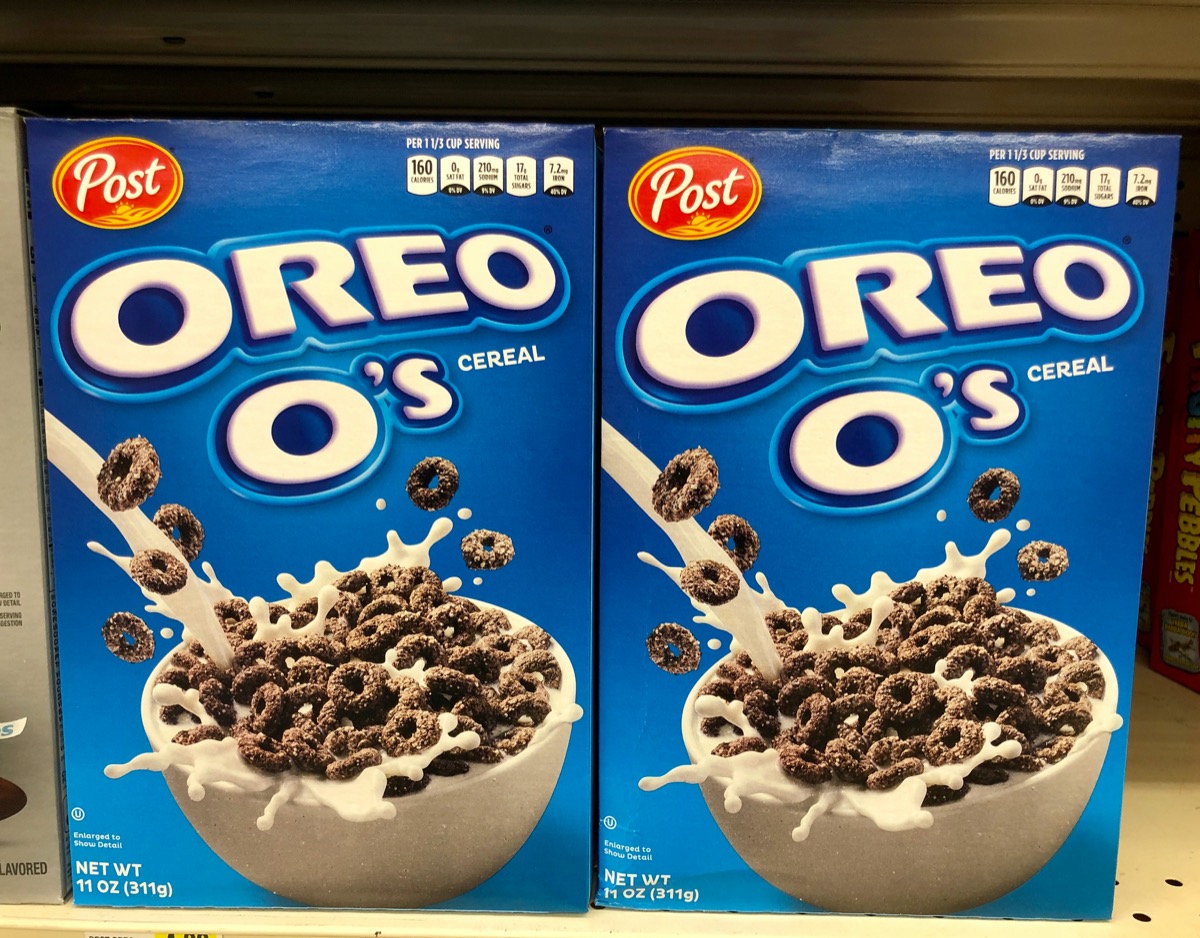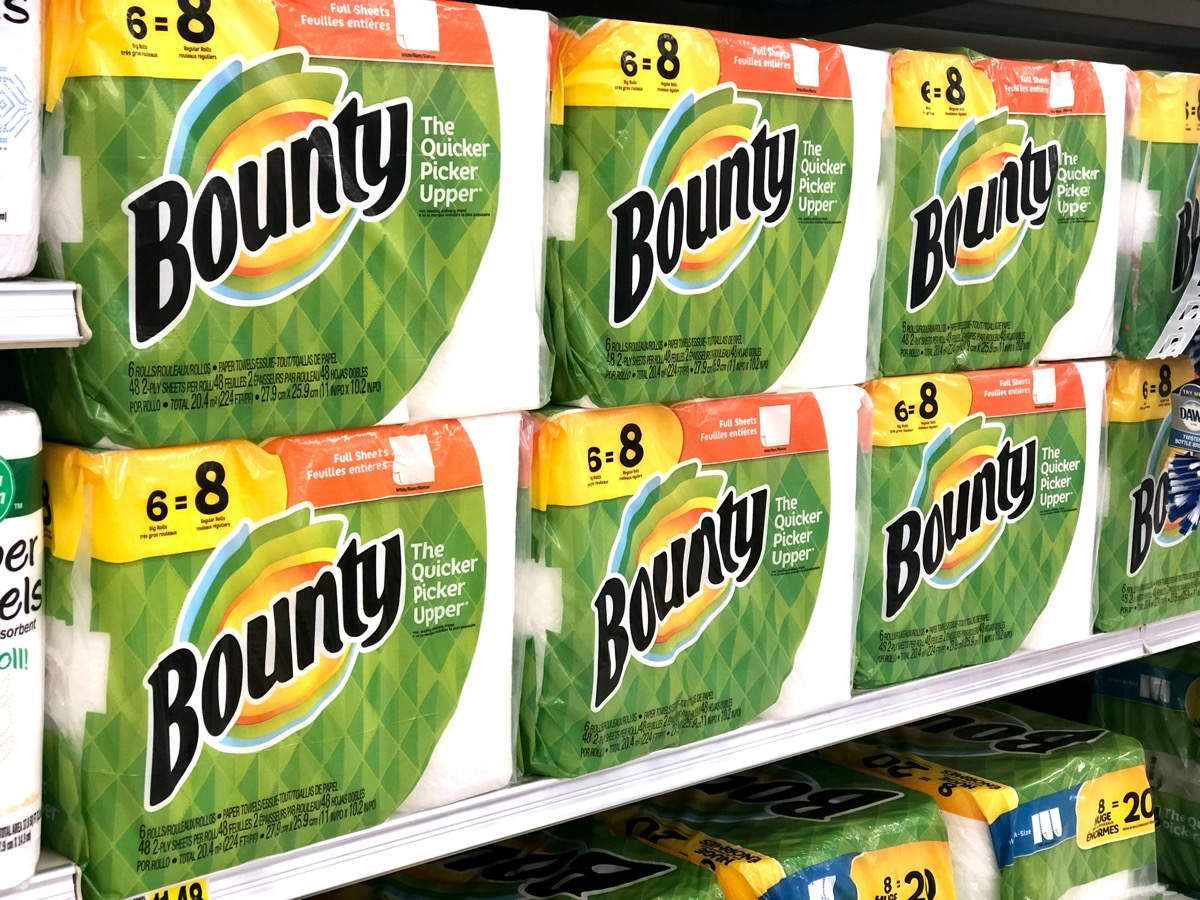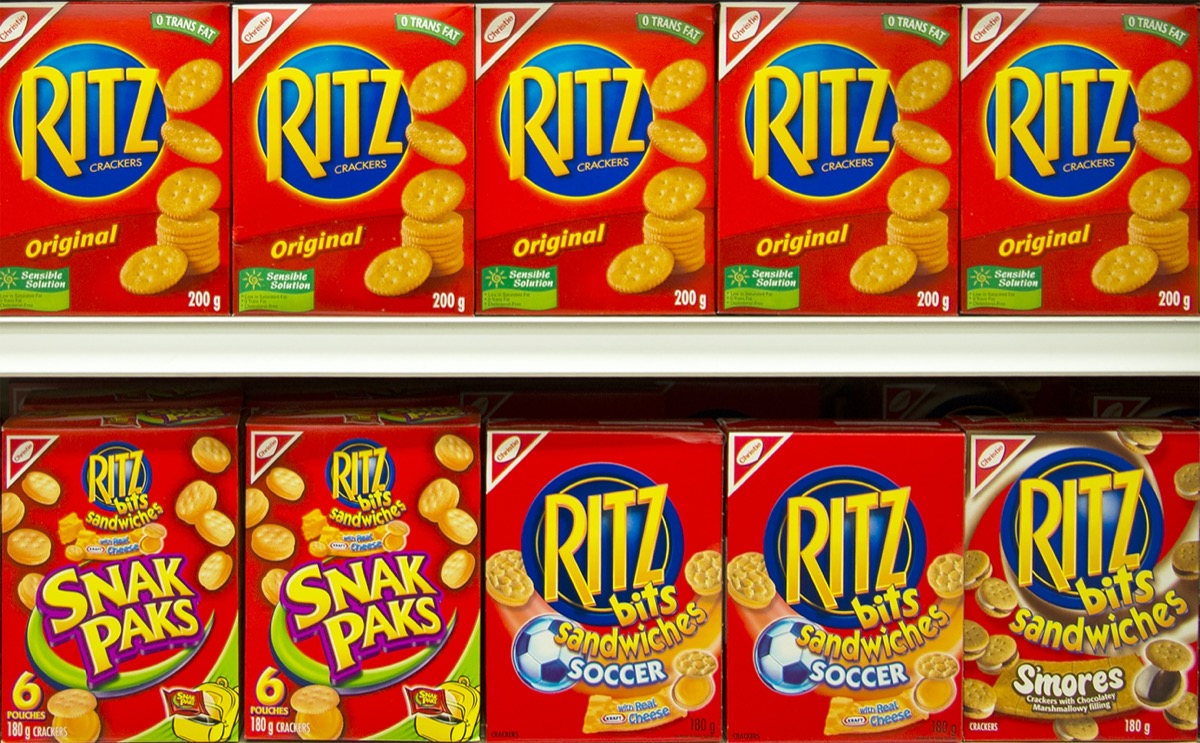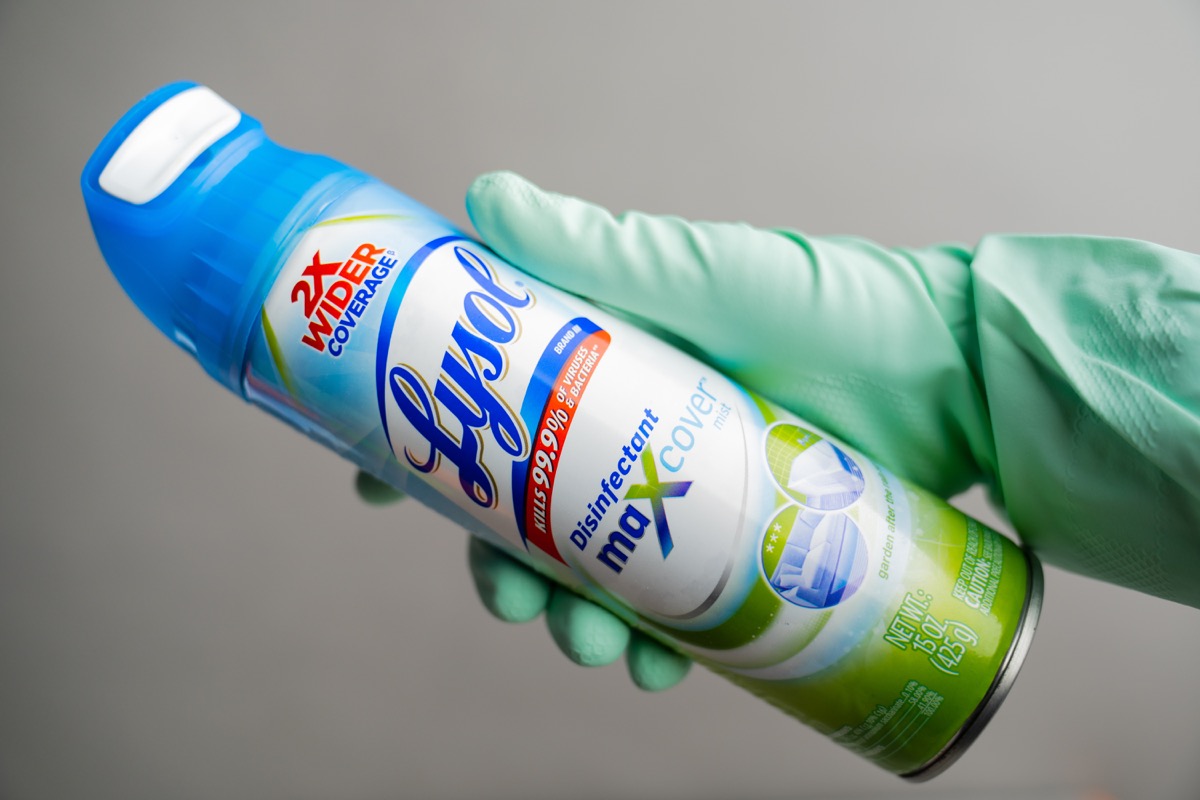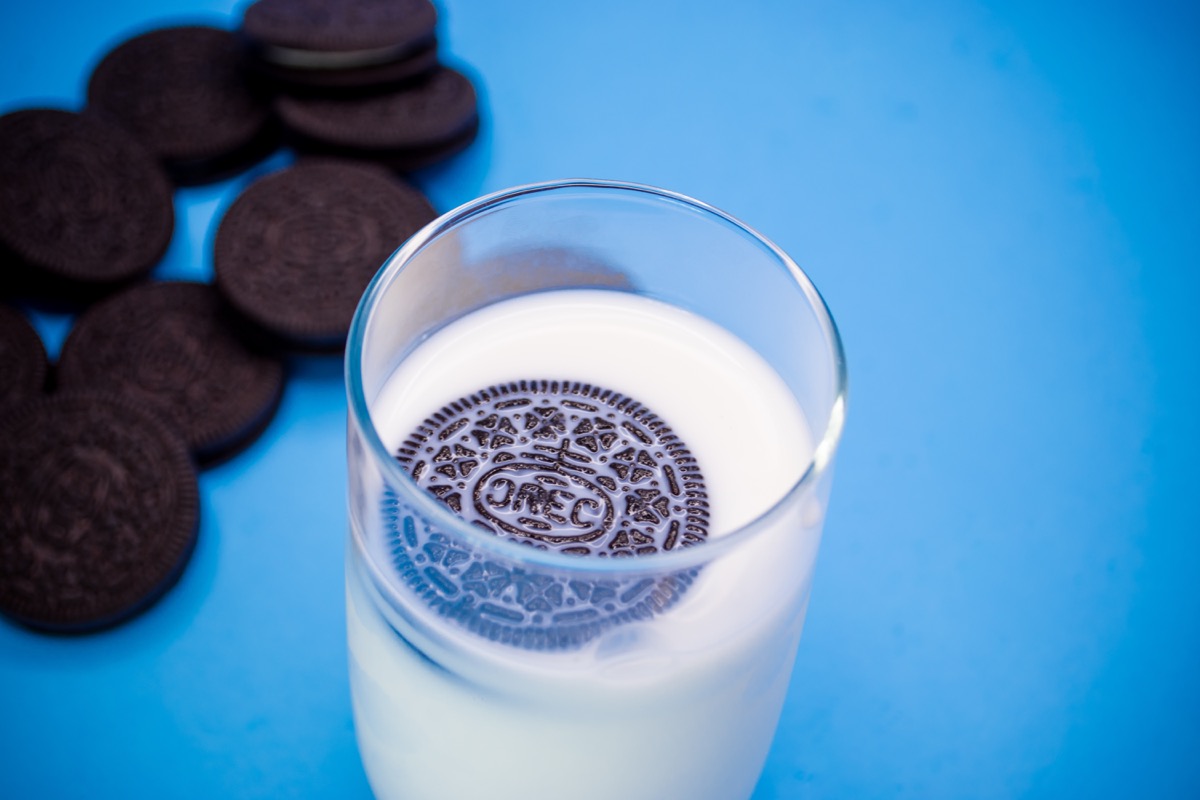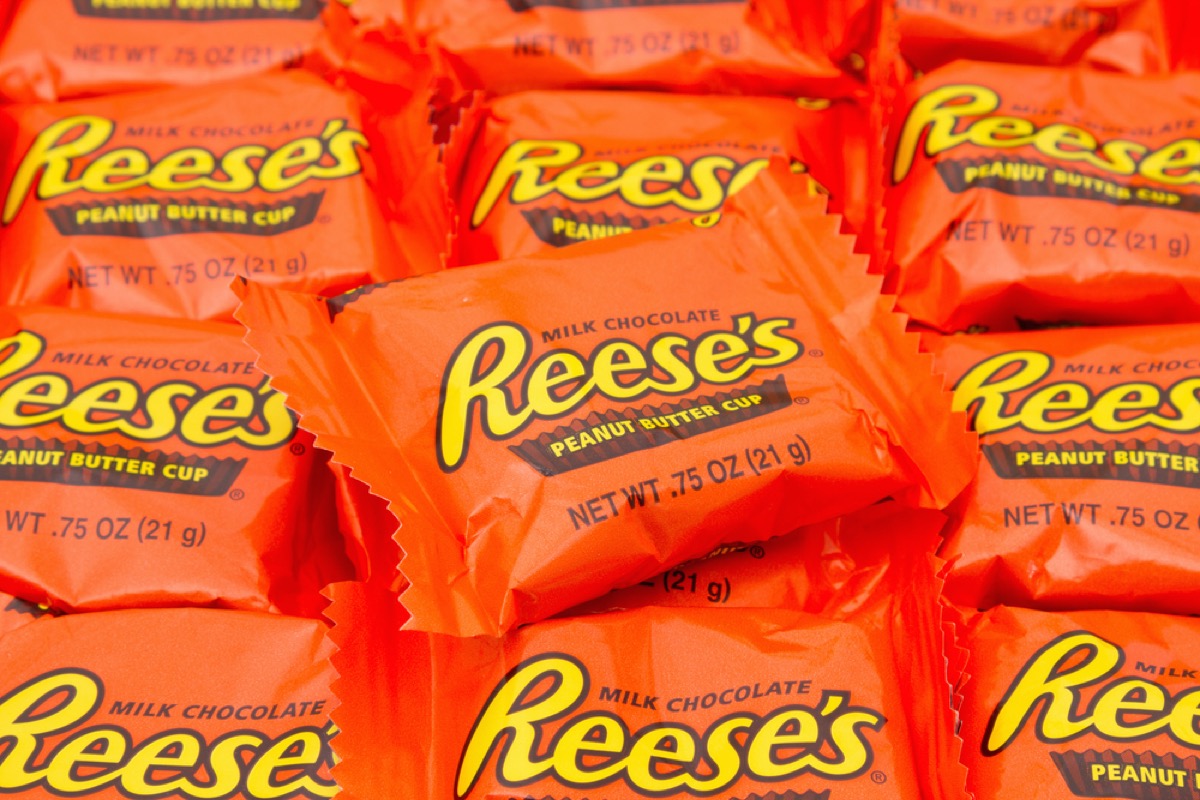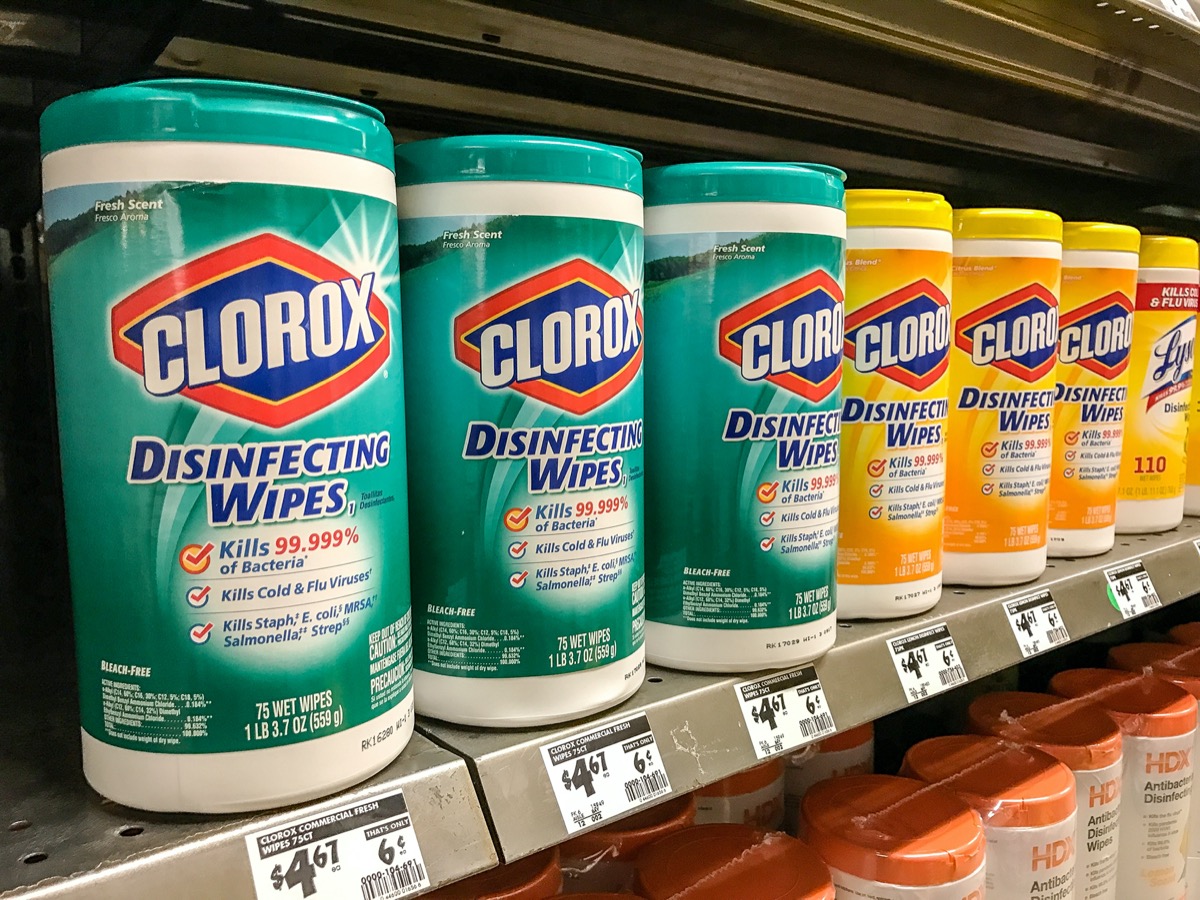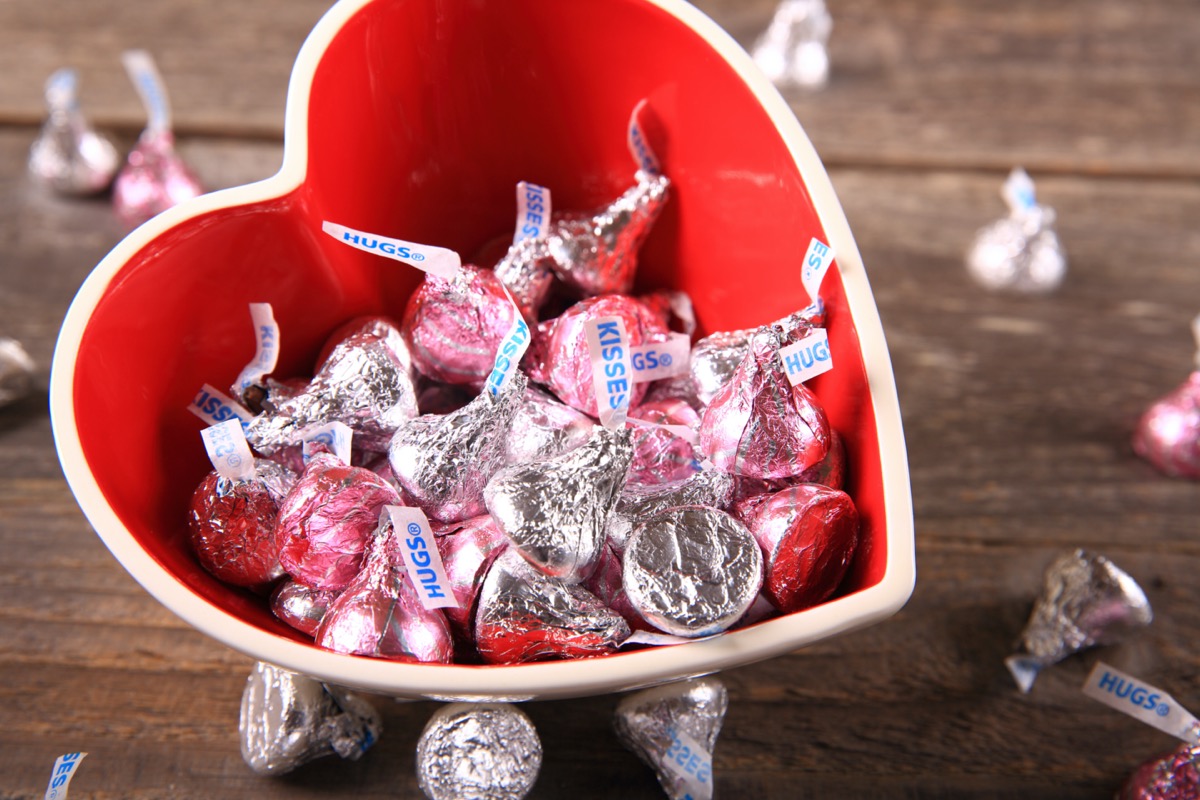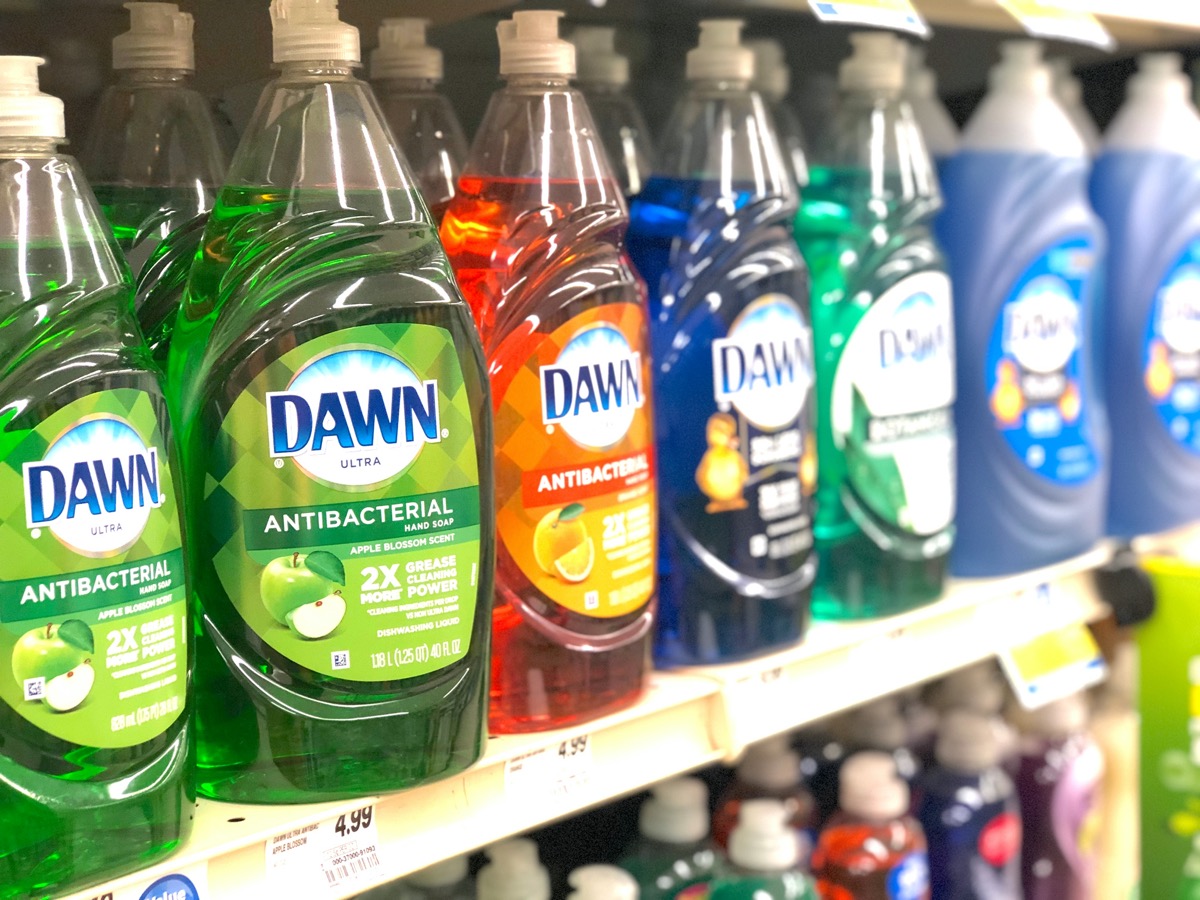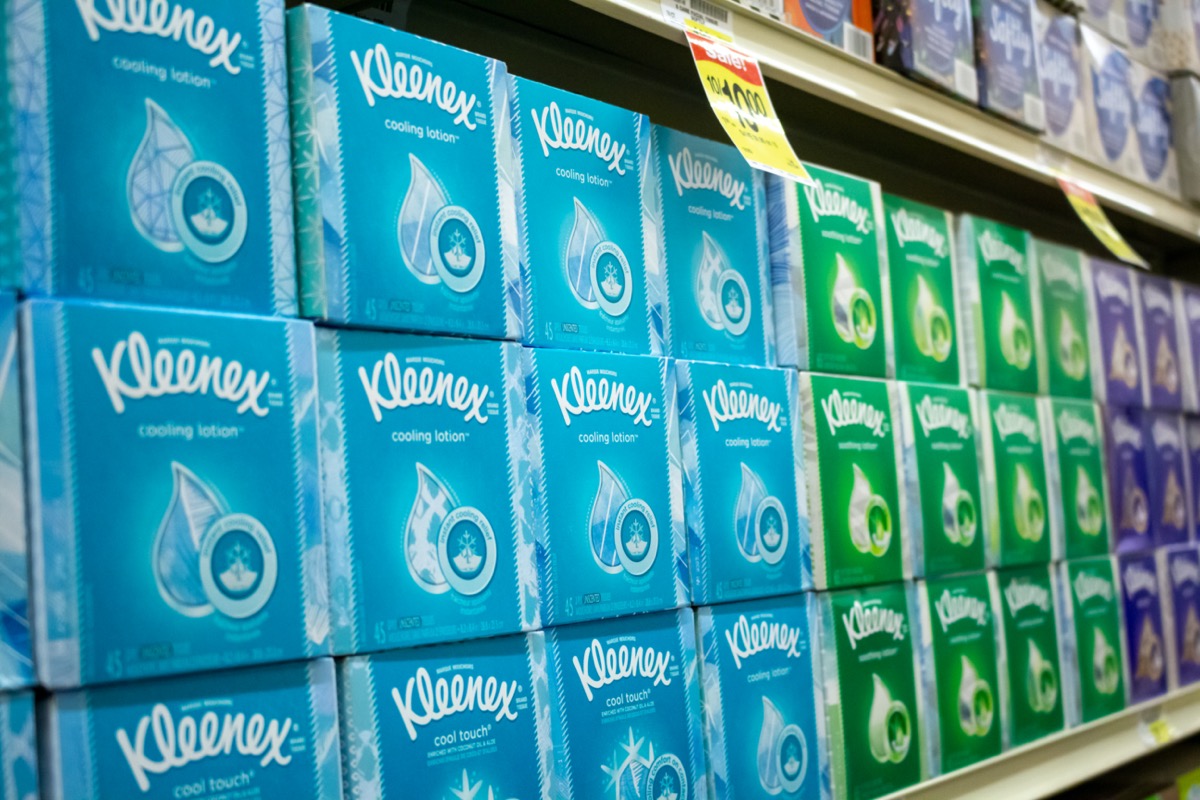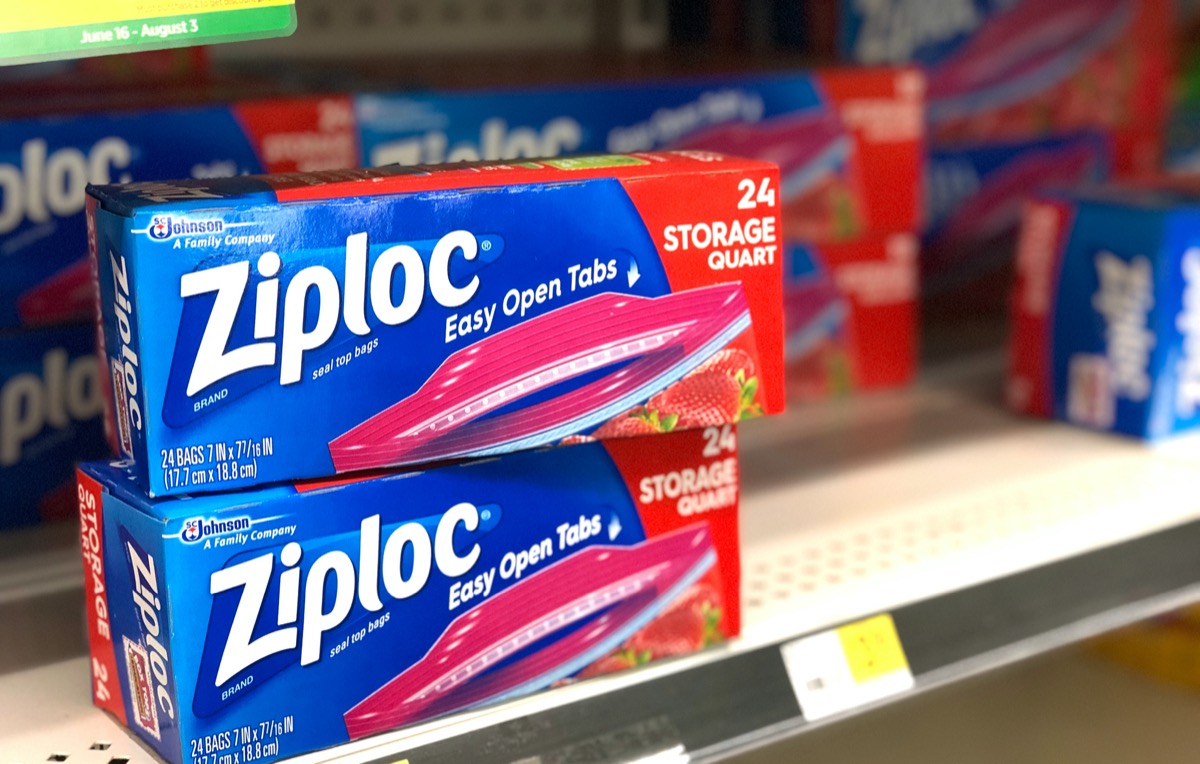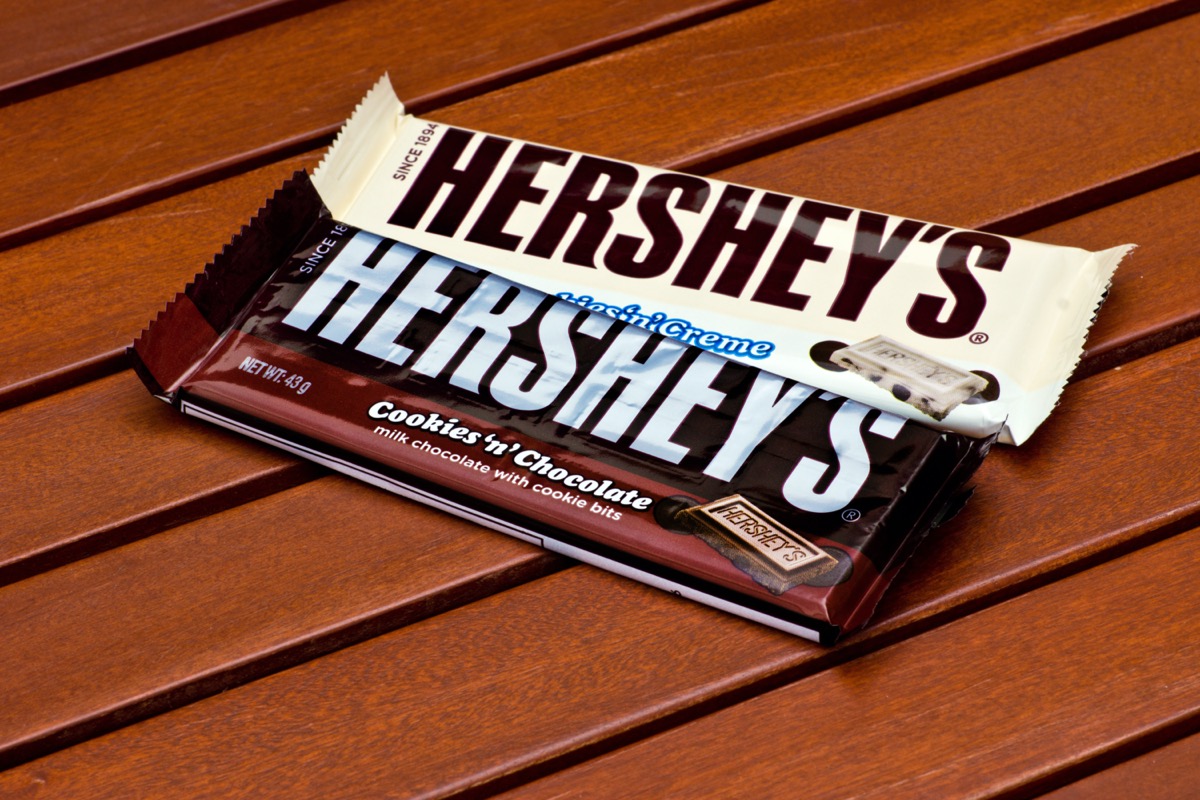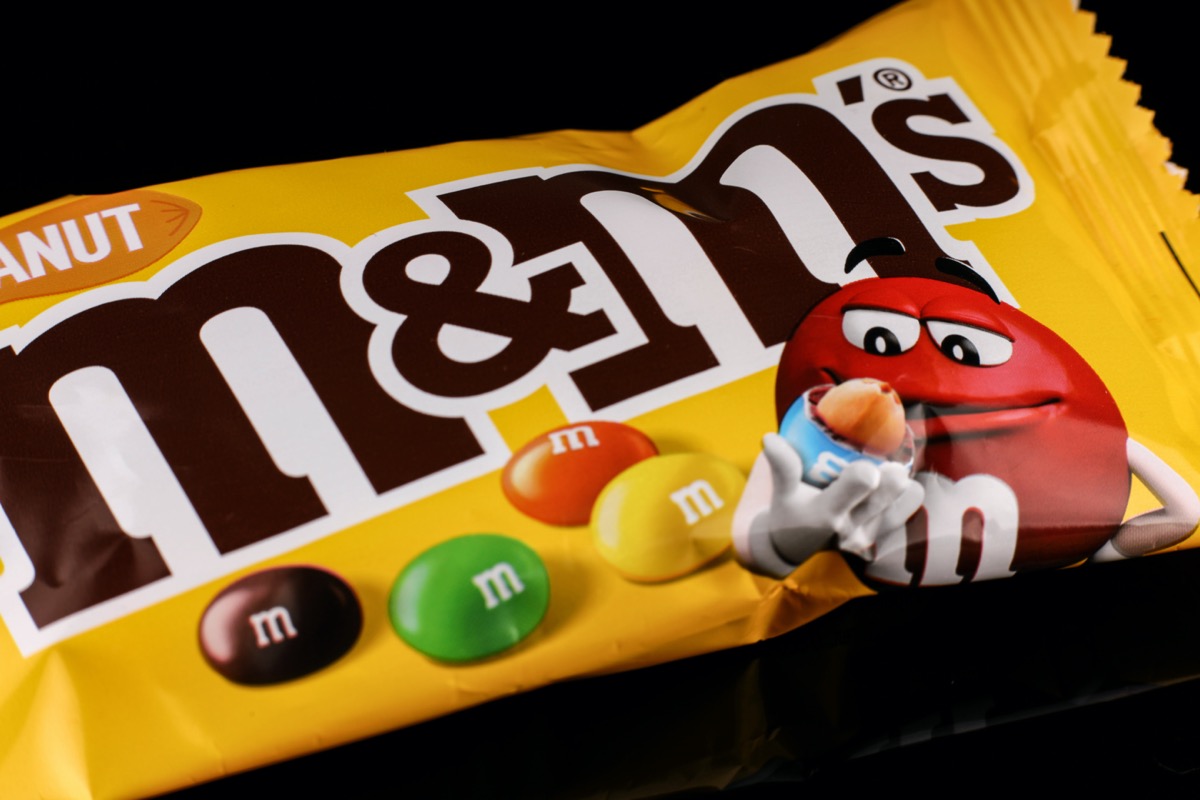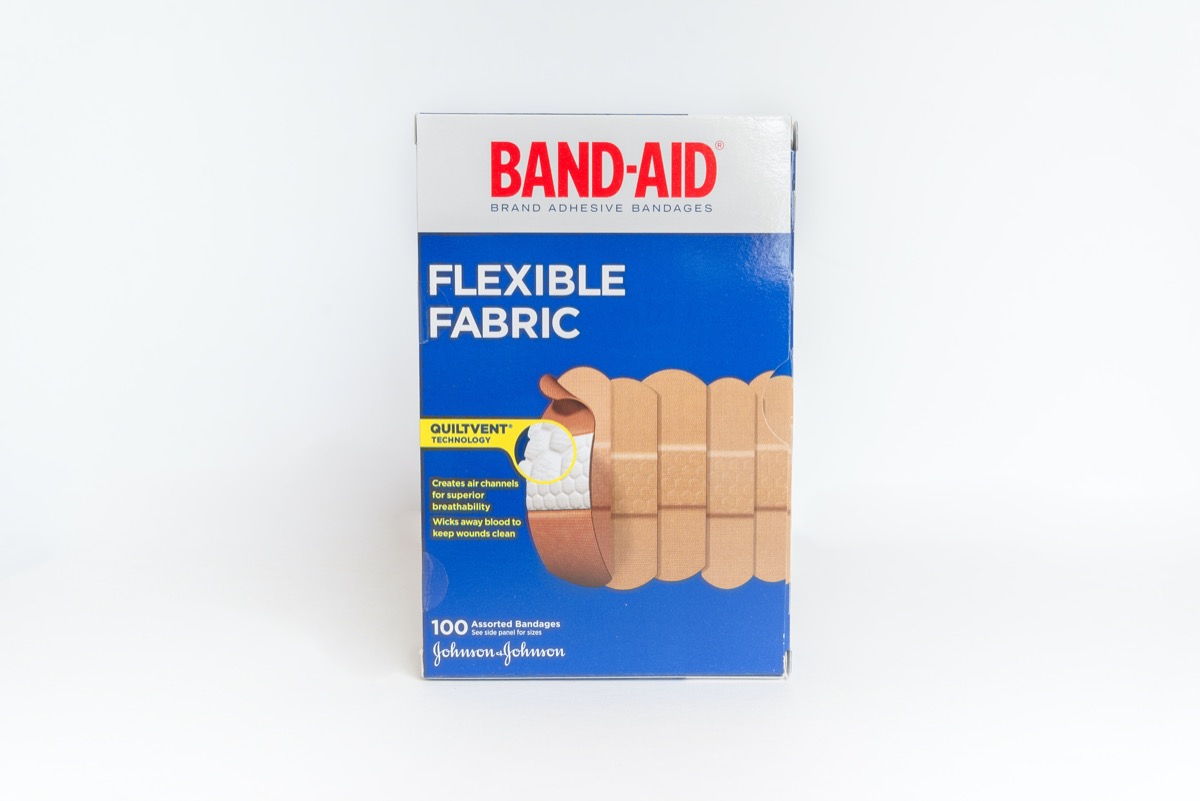The muscular bald man in the tight white t-shirt named Mr. Clean has been an icon of hygienic housekeeping since Chicago ad men invented him in 1957. The all-purpose cleaner that bears his name was originally formulated by a marine ship cleaning businessman who wanted to find a cleaner that was strong enough to cut through grime, but wasn’t so strong that it made sailors sick. Coincidentally, the original model for Mr. Clean’s image was a Navy sailor. And for more great additions to your cleaning arsenal, check out these 20 Genius Products That Make Cleaning So Much Easier.
Introduced in 1958 to compete against the likes of Skippy and Peter Pan, Jif has been the dominant brand of peanut butter in the notably crowded peanut butter aisle since 1981. Jif currently offers a whopping 15 different kinds of peanut butter, with Creamy, Crunchy, and Extra Crunchy being the three most popular.
The quintessential American soup and canning company, Campbell’s has operated out of Camden NJ since 1869. Originally most popular for their line of condensed soups like tomato and cream of mushroom, Campbell’s has diversified to compete with the likes of Progresso, offering a full range of canned soups made to be eaten on their own as well as sticking with the classics that figure into many a casserole recipe. And for more great stories delivered directly to your inbox, sign up for our daily newsletter.
Not to be confused with the brand of soap that also appears in this list, Dove’s name comes from a Chicago-based purveyor of candies and ice cream, which was founded in 1939 by Leo Stefanos. National prominence began with the Dove line of ice cream bars, which are still available today. Perhaps the inspirational messages that come with the little foil-wrapped chocolates that Dove is most famous for have something to do with the brand’s enduring popularity.
Vaseline is both the most popular and the most famous skincare and cosmetics brand, according to YouGov’s data. The brand is most famous for its simple tubs of petroleum jelly, which was originally a byproduct of oil wells known as “rod wax.” They are also the only brand in the top 50 to have a seminal Scottish indie rock band named after them! And for more great personal care products, check out these 20 Skincare Essentials for Women Over 40.
Over the last decade and a half, Netflix has gone from being a wildly popular DVD subscription internet startup to being a wildly popular TV streaming service, responsible in large part for the streaming and cord-cutting revolution of the 2010s. While they have lots of stiff competition in 2020, they are still among the most famous (and beloved) media companies in the world. And if you’re planning a night in, check out these 15 Uplifting Movies You Can Watch on Netflix Right Now.
Dairy Queen is the most popular American brand in YouGov’s dining category, beloved for its seemingly endless line of soft serve ice cream novelties, as well as its more standard fast food fare. 49 states have Dairy Queens—Vermont is the only state currently without one. The state with the most Dairy Queens is Texas, but the state with the most Dairy Queens per person is Minnesota. Synonymous with spices and spice blends of all kinds, McCormick has a dedicated section in many American supermarkets. Aside from its name-brand spices, its portfolio of flavors also includes French’s Mustard, Old Bay Seasoning, Frank’s Red Hot, and Stubb’s. And if you want to avoid buyer’s remorse, make sure to avoid The 20 Worst Things to Buy at Costco. Take the simple pleasures of the tortilla chip and combine them with various flavors of engineered-to-be-delicious powder coating, and you have the modern Dorito, a famously irresistible snack chip. When they launched in 1966, however, there was only one flavor: Toasted Corn. Nacho Cheese flavored Doritos emerged in 1972, and Cool Ranch followed in 1986. The Discovery Channel began broadcasting 12 hours a day to 156,000 viewers in 1985. In the early years, the channel focused on educational programming, but by the early 2000s had retooled its lineup to appeal to a broader audience. By 2020, Discovery Channel had dropped the “the” from its name, and was named the most popular TV network by a YouGov survey. Levi’s is a company with a generally well-known history. Founder Levi Strauss emigrated from Germany to San Francisco, and together with his partners, made his name selling dry goods during the California Gold Rush. A tailor named Jacob Davis came up with the idea to reinforce denim pants with copper rivets, and when he approached Strauss about going into business together, the original Levi’s jeans were born. Not to be confused with the chocolate maker of the same name, Dove’s product line includes soaps, body washes, deodorants, and beauty products, and its products are solid in more than 150 countries. Dove is owned by the British-Dutch consumer goods company Unilever, which is the largest producer of soap in the world. Crest’s origin story begins in the 1950s, when three scientists at Indiana University came up with the formula for a fluoridated toothpaste. One of them sold the patent to Procter & Gamble, and the royalties from the patent financed dental research at the university for many years to come. Crest currently has eight different product lines of toothpaste, each with different formulas for different types of dental care. Cheerios cereal, which is the best-selling cereal in North America, is beloved for its simplicity. After going through over 500 experimental formulas, in 1941 General Mills introduced the cereal as “CheeriOats,” and the name was shortened to Cheerios 4 years later. Variations on the original Cheerios flavor began in the 1970’s with Cinnamon and Honey Nut Cheerios making their debuts.
Unlike most of the companies on this list, Nestlé Toll House makes only a few things, but it makes them well. Nestlé Toll House is solely known for their chocolate chips and their chocolate chip cookie dough, and for good reason: the world’s first chocolate chip cookie was made by Ruth Wakefield at the Toll House Inn in 1936, using a bar of semi-sweet Nestlé chocolate. Wakefield and Nestlé agreed that her recipe would be printed on the cover of all of their semi-sweet chocolate bars, which continues to this day.
Betty Crocker is yet another popular American food brand, responsible for producing some of America’s most popular baking mixes, snacks and recipes. Betty Crocker is also a fictional character created to represent the brand—she was named in 1921, and went on to be portrayed by several actresses on radio and television, and even in character in print in the company’s earlier cookbooks.
The Kellogg Company began with the accidental invention of corn flakes, which John and W.K. Kellogg served to patients at the Battle Creek Sanitarium. At present, Kellogg’s is one of the most successful manufacturers of cereal in the world, and are also responsible for many popular snack foods, including Cheez-It and Town House crackers.
Approved for medical use in 1971, Neosporin is the most popular topical antibiotic in the United States, and unlike other formulas, can be purchased over the counter. Neosporin contains three different antibiotics, making it effective against a wide variety of infections caused by minor wounds.
In 1900, in Winston, North Carolina, a former tobacco farmer founded a clothing company that would eventually bear his name—but at the time, he named it Shamrock Knitting Mills. 14 years later, it was renamed after its founder. Hanes is mostly known for their reliable and affordable underwear and socks, making it the most popular clothing brand in the country.
Heinz ketchup is the most popular brand of ketchup in America by far, commanding 60 percent of the total ketchup market. In Europe, Heinz is even more dominant when it comes to ketchup, with 80 percent market share. In addition to the most popular standard version of their ketchup, Heinz offers versions containing sugar instead of corn syrup, and several regionally available flavors.
The Frito Company and H.W. Lay & Company were competitors for thirty years before merging in 1961 to form Frito-Lay. At present, Frito-Lay manufactures many of America’s most popular snacks, including Lay’s, Fritos, Doritos, Ruffles, and Cheetos.
When it comes to Heinz, it’s not just about ketchup: Heinz is also popular in the United States for their other sauces and condiments, like mustard and pickle relish. In 2015, Heinz merged with Kraft, and the resulting conglomerate is the fifth biggest food company in the world.
Korean conglomerate Samsung is best known in the United States for Samsung Electronics, which produces its consumer electronics and home appliances. And while Samsung Electronics is the world’s biggest technology firm in terms of revenue, Samsung has many other divisions, including shipbuilding, life insurance, construction, and advertising.
As a company, Pillsbury is no longer—it was bought by General Mills, who then sold off some of its products to other companies. However, its baked goods and other food products are still well-loved, as is its mascot, the cutely rotund Pillsbury Doughboy—as evidenced by its number 26 spot on YouGov’s poll.
Unlike most brands on this list, the origin story of WD-40 is shrouded in mystery. The story of who actually invented the world famous water-displacing spray is different depending on who you talk to. The exact formula is a secret and was never patented so as to avoid disclosing its ingredients. What isn’t a secret is WD-40’s versatility—the spray is used in a hundred different ways in households all over the world.
The Kit Kat bar was invented in the United Kingdom by Rowntree’s, a candy company based in York. An employee at Rowntree’s put a recommendation in a suggestion box for a snack that was portable enough for a man to take to work in his pack, and the result became the Kit Kat. Originally called Rowntree’s Chocolate Crisp, it was renamed Kit Kat Chocolate Crisp in 1937. At present, the Kit Kat is manufactured by Hershey’s in the United States, and by Nestlé in all other territories.
Sony remains the most popular and the sixth most famous tech brand in the United States, known for their PlayStation video game consoles as well as their wide range of consumer and professional electronics. The brand’s name, which was coined in 1958, is a combination of the Latin word “sonus,” which means sound, and the American 1950s slang word “sonny.”
The Snickers formula of nougat, peanuts, caramel and chocolate is loved by Americans—so loved, in fact, that Snickers is the most popular candy bar brand in the country. The candy bar, which was introduced in 1930, is named after the favorite horse of the Mars family, scions of the Mars candy empire.
UPS, or the United Parcel Service is the most popular and most famous communications and media brand in the United States, according to YouGov’s data. Known by its distinctive brown uniforms and delivery vans, UPS operates 120,000 vehicles across the world. In January, UPS invested in U.K. electric vehicle company Arrival, and ordered 10,000 electric vehicles in its first steps toward developing a carbon-neutral fleet.
Like an Ohioan Mona Lisa, the Quaker mascot has stared out stoically from tins and boxes of Quaker products since 1877, when Henry Seymour of the Quaker Mill Company applied for the mascot’s trademark, “a man in Quaker garb.” While Quaker’s origins are in Ohio, the Quaker Oats company was founded almost 25 years later in New Jersey, with a headquarters in Chicago, as a result of a merger between four grain-processing companies.
In a unique PR move, Planters “killed off” their mascot Mr. Peanut this year, replacing him (at least temporarily) with a rapidly aging mascot known as Peanut Jr, who was, up until recently, known as Baby Nut. American consumers seem not to have paid any of these shenanigans much mind: no other purveyor of legumes enjoys the brand recognition and acclaim that Planters does.
One reason for the popularity of Lay’s Chips (the 11th most popular and 11th most famous snack brand, per YouGov) is the product variety the company offers. Across several continents, Lay’s manufactures a staggering variety of potato chips, in different flavor and texture combinations. Whether it’s dill pickle, Chesapeake Bay spice, or cheddar jalapeño that suits your fancy, Lay’s has you covered.
Windex window cleaner was invented in 1933 by the Drackett company, who also invented Drano. Windex’s distinctive blue color wasn’t always so bright, however: its original formula was a lighter blue. Like many products on this list, Windex has been owned by several different parent companies over the years: Bristol Meyers owned Windex starting in 1965, but sold it to S.C. Johnson in 1993, and the latter company has been producing it ever since. And if you want to keep your home spotless, check out these 30 Amazing Cleaning Tips You’ll Wish You Knew Sooner.
Lay’s is the flagship (flagchip?) chip brand of Pepsico. Lay’s was founded by Nashville salesman Herman Lay in 1938, when he bought the Atlanta-based Barrett Food Company and renamed it after himself, selling potato chips from the trunk of his car.
It’s not just cookies anymore: in addition to its beloved sandwich cookies, Oreo has marketed variations of its cookie-and-creme formula in ice cream bars, cereals, and candy bar crossovers.
The “quilted quicker picker-upper” was introduced in 1965 by consumer goods giant Procter & Gamble as a spin-off of Charmin, which manufactured multi-purpose paper towels at the time. Bounty set itself apart by introducing a two-ply paper towel which, true to the motto, was thicker, tougher, softer, and more absorbent than its competitors at the time.
Ritz has been a division of Nabisco since the introduction of the Ritz Cracker in 1934. The name was intended to appeal to consumers looking for affordable luxuries during the Great Depression, and the buttery circular cracker, which is sold by the box and by the sleeve, continues to deliver today.
Another juggernaut of the household cleaning aisle, Lysol is best known for their disinfectant liquids. Unlike many popular American brands, Lysol originated in Germany during a cholera epidemic, and went on to be a key weapon in the fight against the 1918 Spanish Flu. Today, Lysol comes in a spray and a concentrate, and the formula has been spun off into cleaners designed specifically for bathrooms and kitchens. And if you want to keep your home cleaner, stock up on these 5 Disinfectants That Kill Coronavirus in 30 Seconds or Less.
While the Oreo began as an imitation of the Hydrox cookie, Oreo transcended its origins to become the most popular cookie brand in the country. While there have been variations on the original recipe since the ’70s, in the early 2010s Oreo began regularly introducing limited edition runs of Oreos with experimental flavors like Root Beer and Swedish Fish.
Reese’s founder H.B. Reese was a former employee of a dairy farm in Hershey, Pennsylvania, and, after being a separate entity from the Hershey Company for 40 years since its founding, Hershey’s and Reese’s finally merged in 1963. In addition to their famous peanut butter cups, Reese’s makes several other popular confections, including Reese’s Pieces, Nutrageous, and Take 5.
When you reach for bleach in the household cleaning aisle, chances are you’re reaching for Clorox. In addition to bleach, Clorox makes many household cleaning products, and owns other well-known household brands like Brita, Liquid Plumr, and Burt’s Bees.
One of the Hershey Company’s first confectionary hits, Hershey’s Kisses were first produced in 1907, and were wrapped by hand until 1921. While the most popular variety is the original milk chocolate, other varieties include caramel, hazelnut, cookies and cream, and candy cane.
The legendary combination of peanut butter and chocolate is at the heart of Reese’s Peanut Butter Cup’s status as the third most popular snack brand in the United States and the fifth most trusted brand overall. In fact, according to a 2019 poll from Monmouth University, Reese’s Peanut Butter Cups were named the most popular candy in America, earning 36 percent of the vote.
Introduced in 1973—relatively recently compared to some of the other brands that top this list—Dawn is the bestselling brand of dishwashing liquid in North America, and has historically been used at oil spills for its grease-repellant properties to clean up wildlife. On other continents, Dawn is sold under the brand name Fairy.
Another brand whose name is synonymous with the product they manufacture, Kleenex began operations during World War I, originally making filters for gas masks. Kleenex’s brands include Cottonelle and Huggies, but the brand is best known as the makers of the most popular facial tissue in the world, which is sold in more than 170 countries.
Ziploc is the most popular household brand in the United States, known mostly for its resealable plastic bags. The company’s product offerings have evolved significantly over the past few decades, however; the Ziploc Evolve bag, which uses 35 percent less plastic than traditional Ziploc bags and is manufactured using wind power, won the “Best in Show” award at the 2010 Best New Product Awards in Canada.
The Hershey Company (commonly known as Hershey’s) has been synonymous with candy in the U.S. for the last century, manufacturing many of the best-known chocolate candies in the world, including M&M’s, Twizzlers, Hershey’s Kisses, and Kit Kats. Today, the company’s products are available in over 60 countries worldwide.
M&M’s got their start as a ration for the U.S. Army in World War II—like the British equivalent, Smarties, their candy shells were thought of as a good way to prevent candy from melting in warm climates. The soldiers loved them, and they are now the most popular food and snack brand in America, according to YouGov polls.
When your brand name (“Band-Aid” returns 541 million results on Google) has become a more common word for the product than the original product itself (“bandage” only returns 123 million), you know you’re dominating your market. Band-Aid makes a reliable, inexpensive product, and consumers are incredibly loyal to their line of adhesive bandages as a result.
